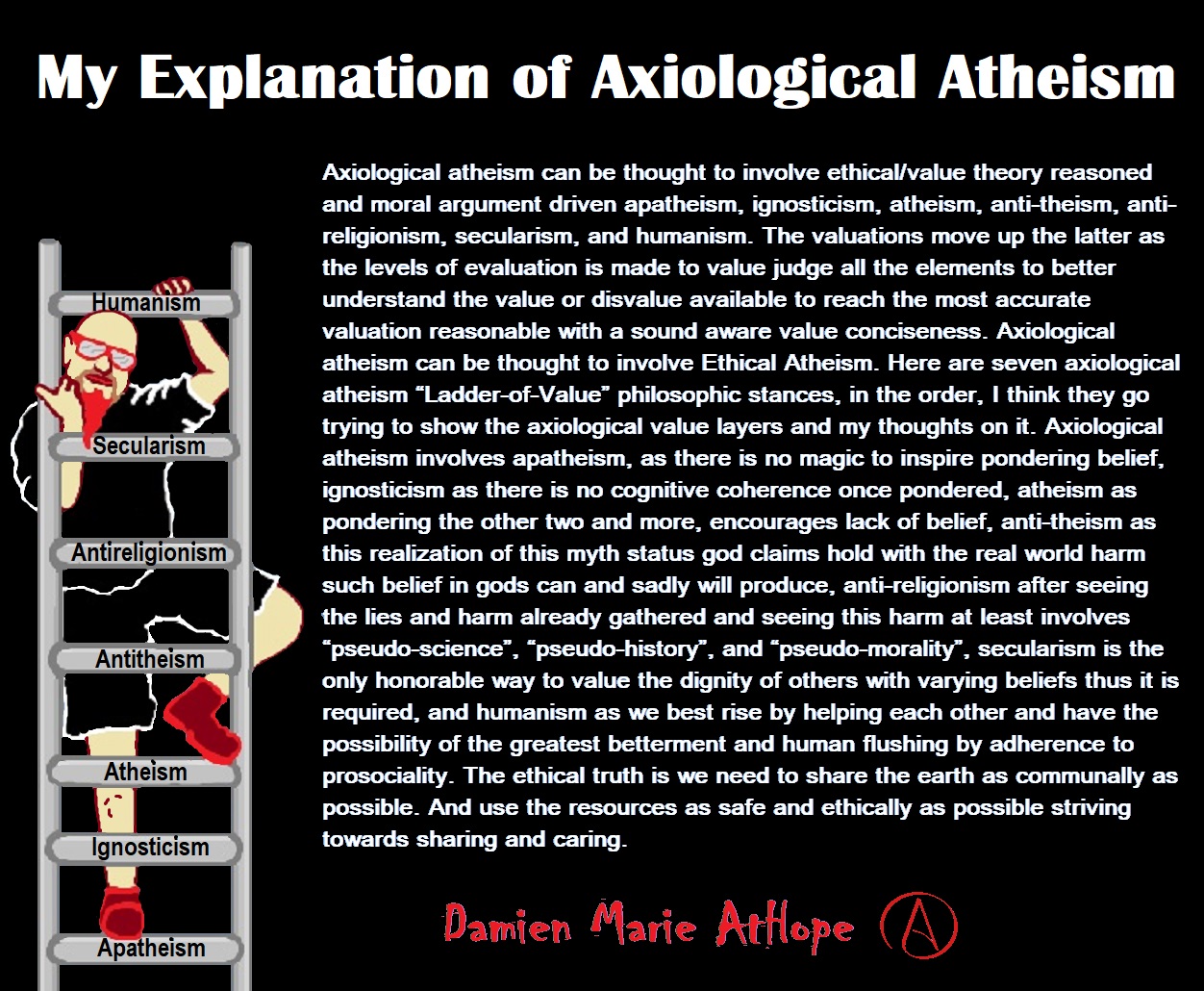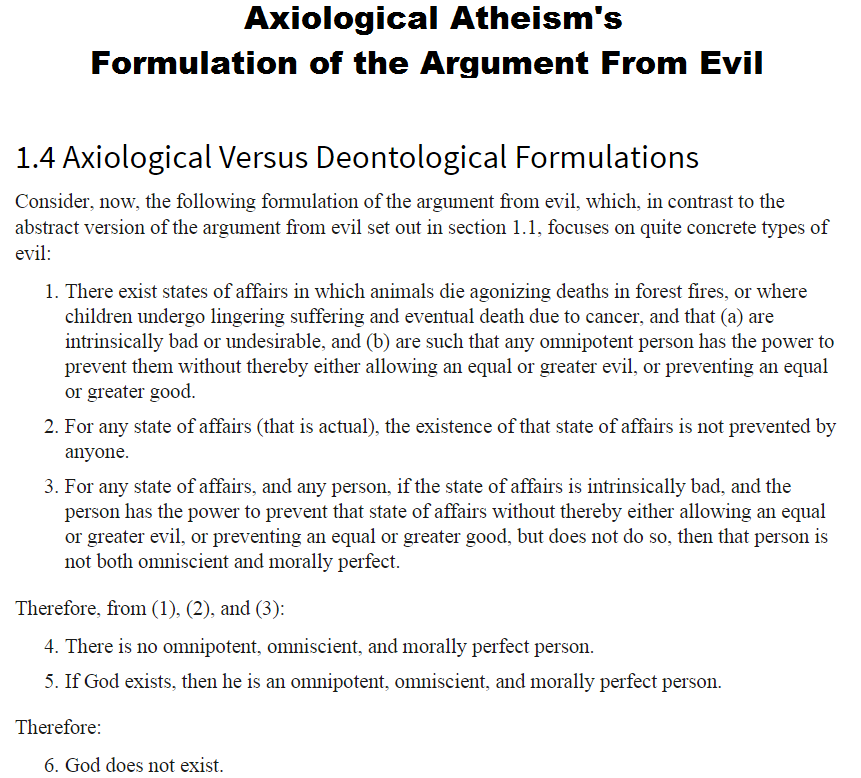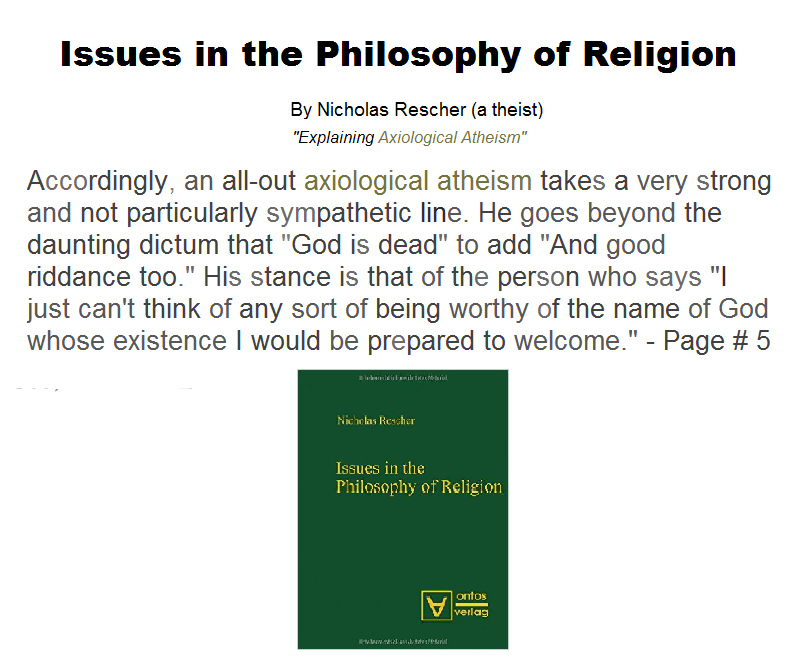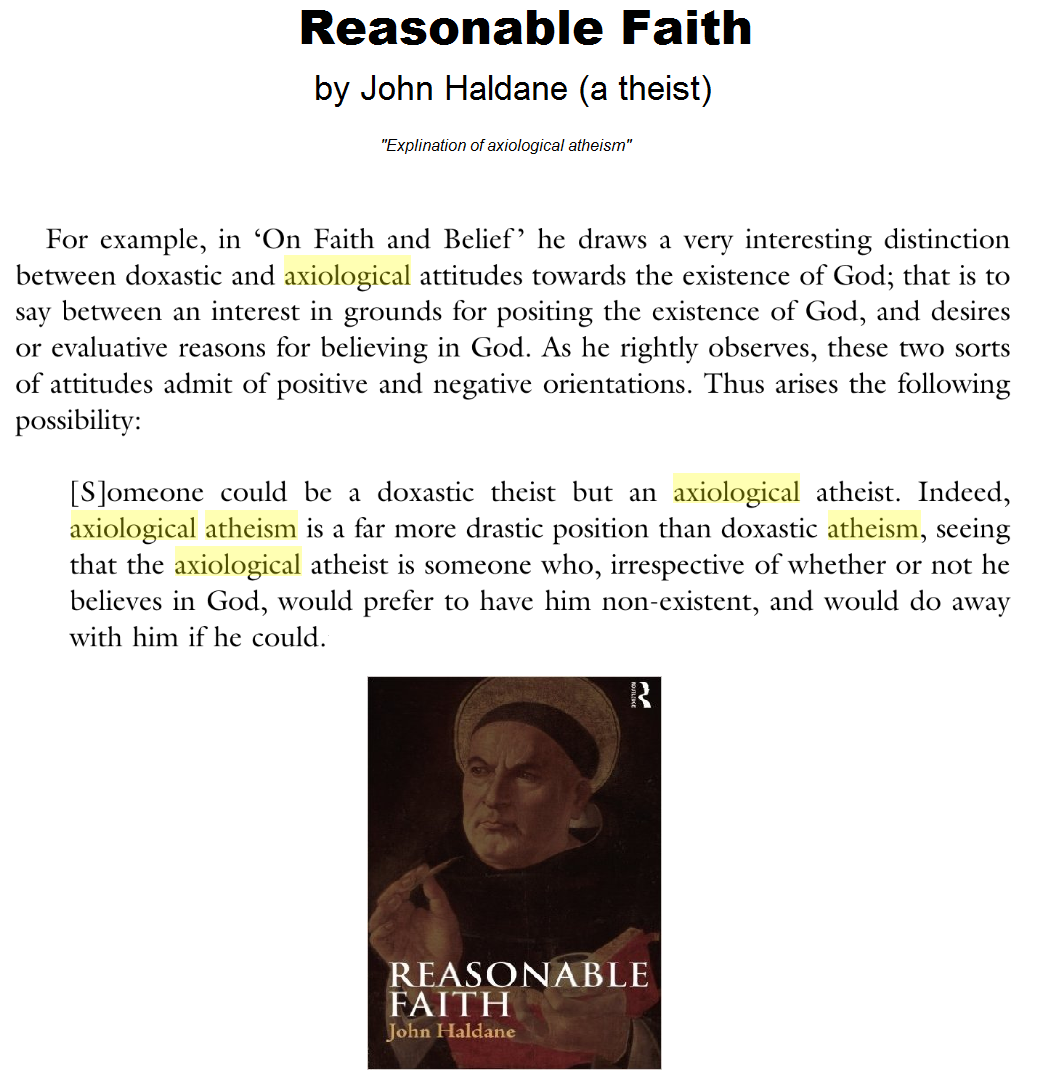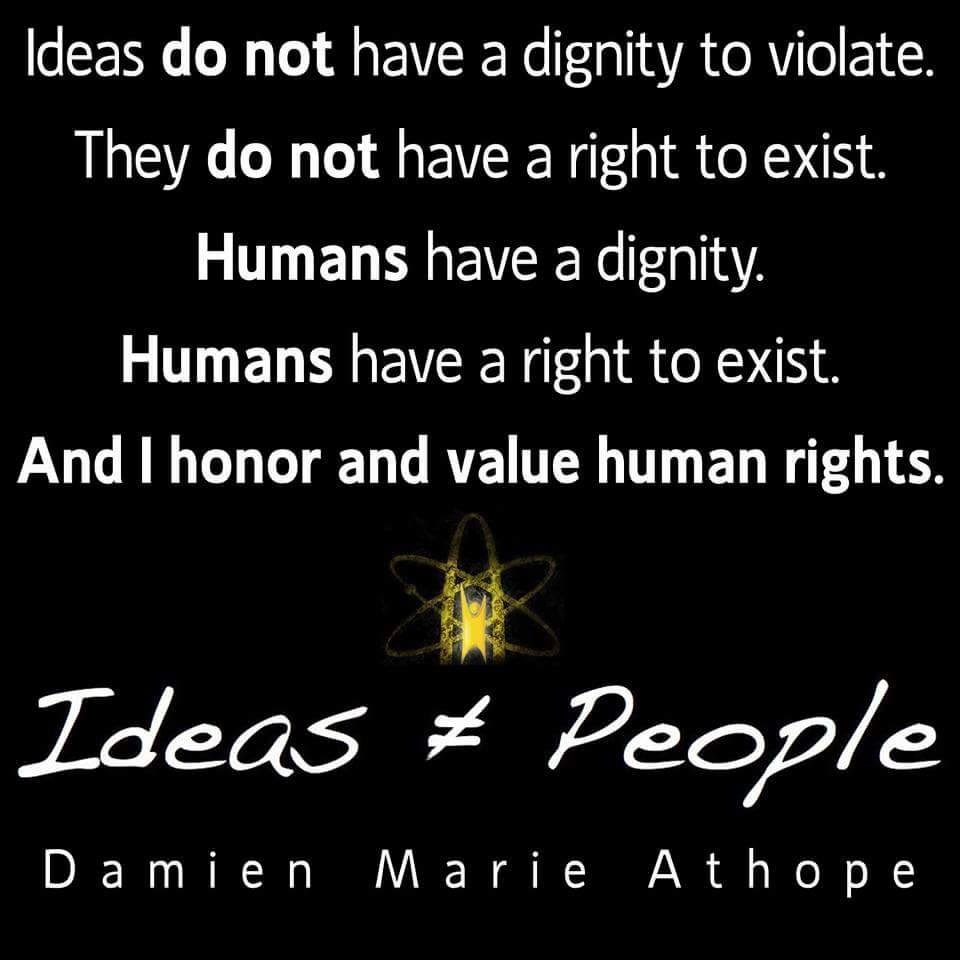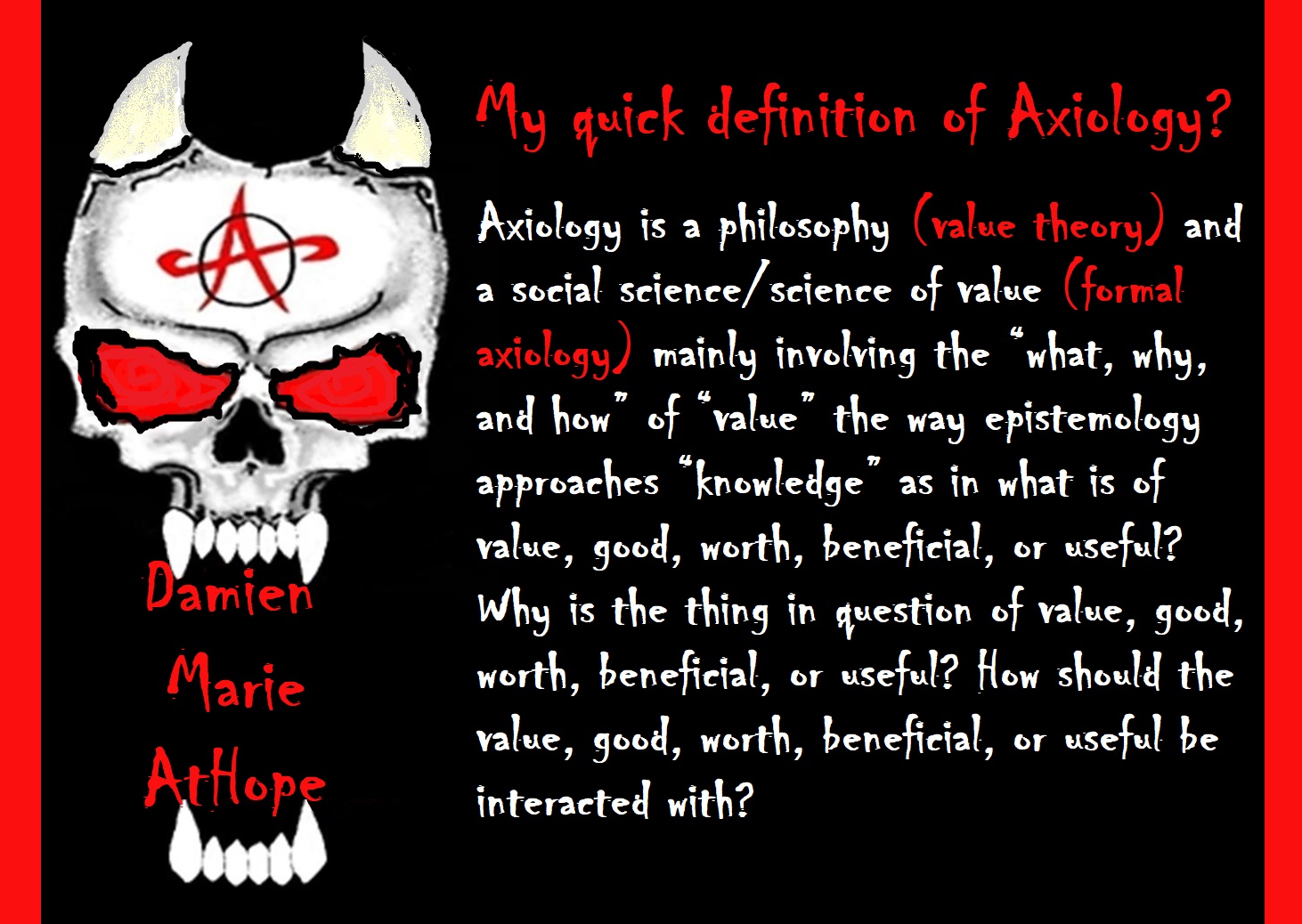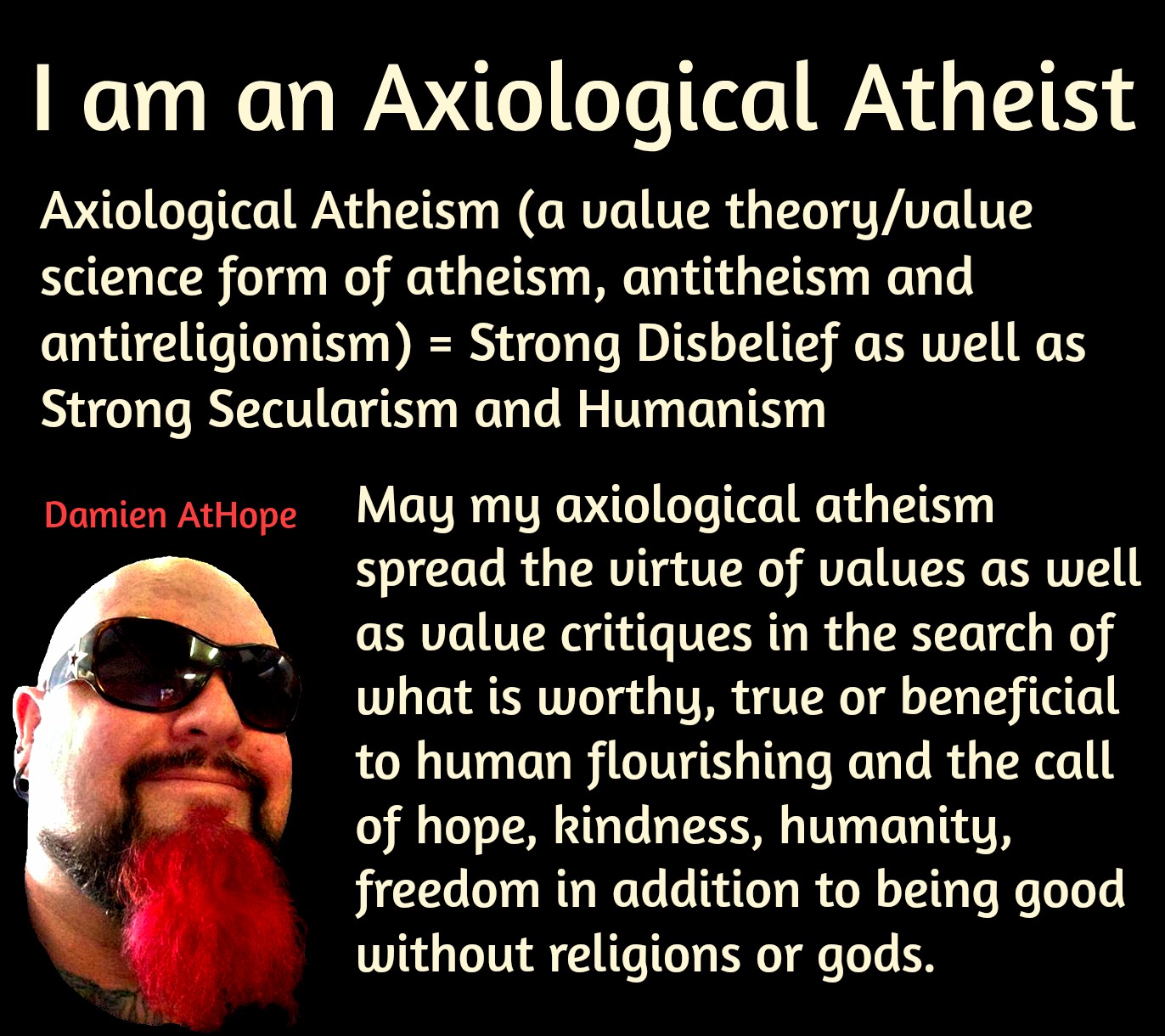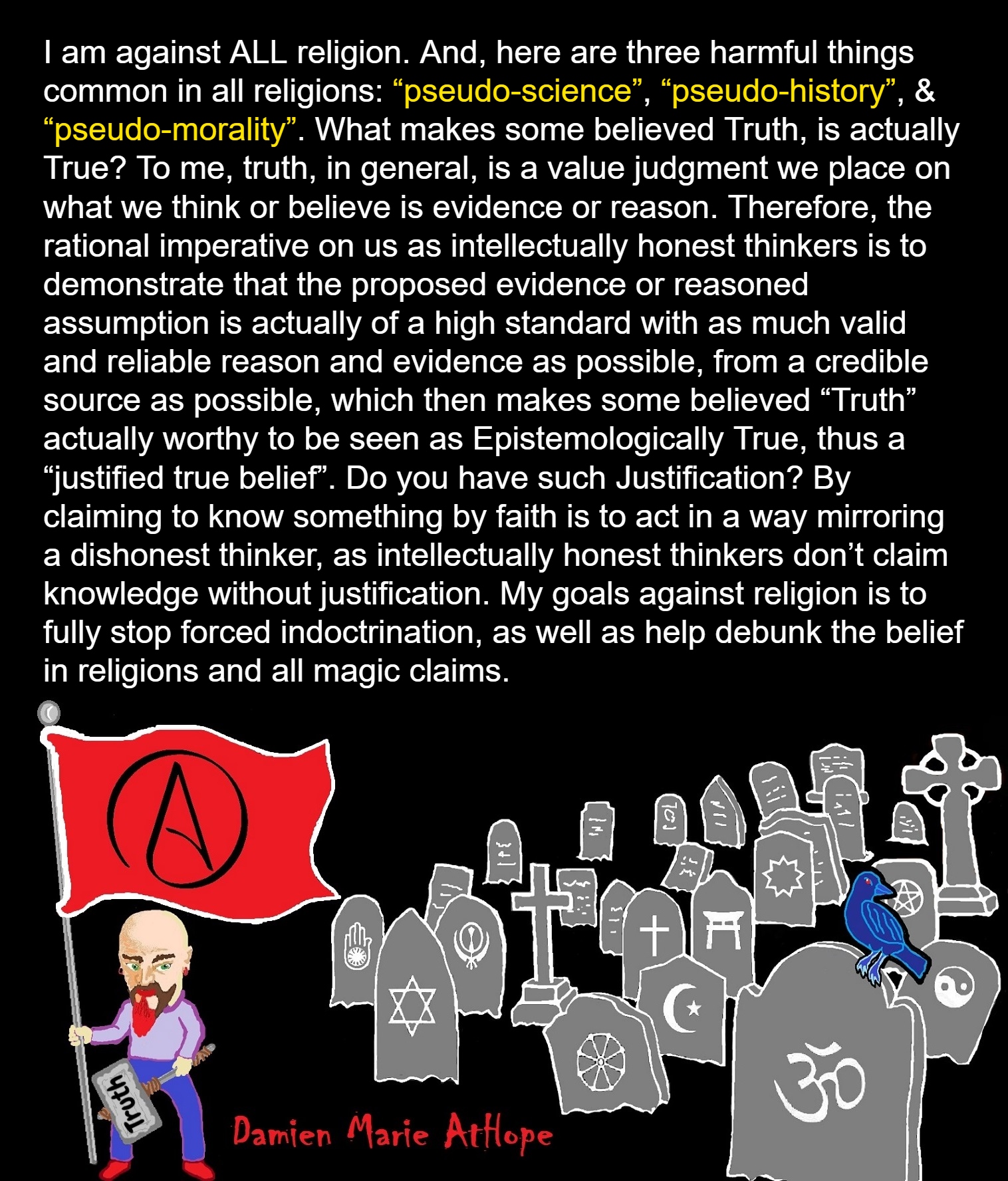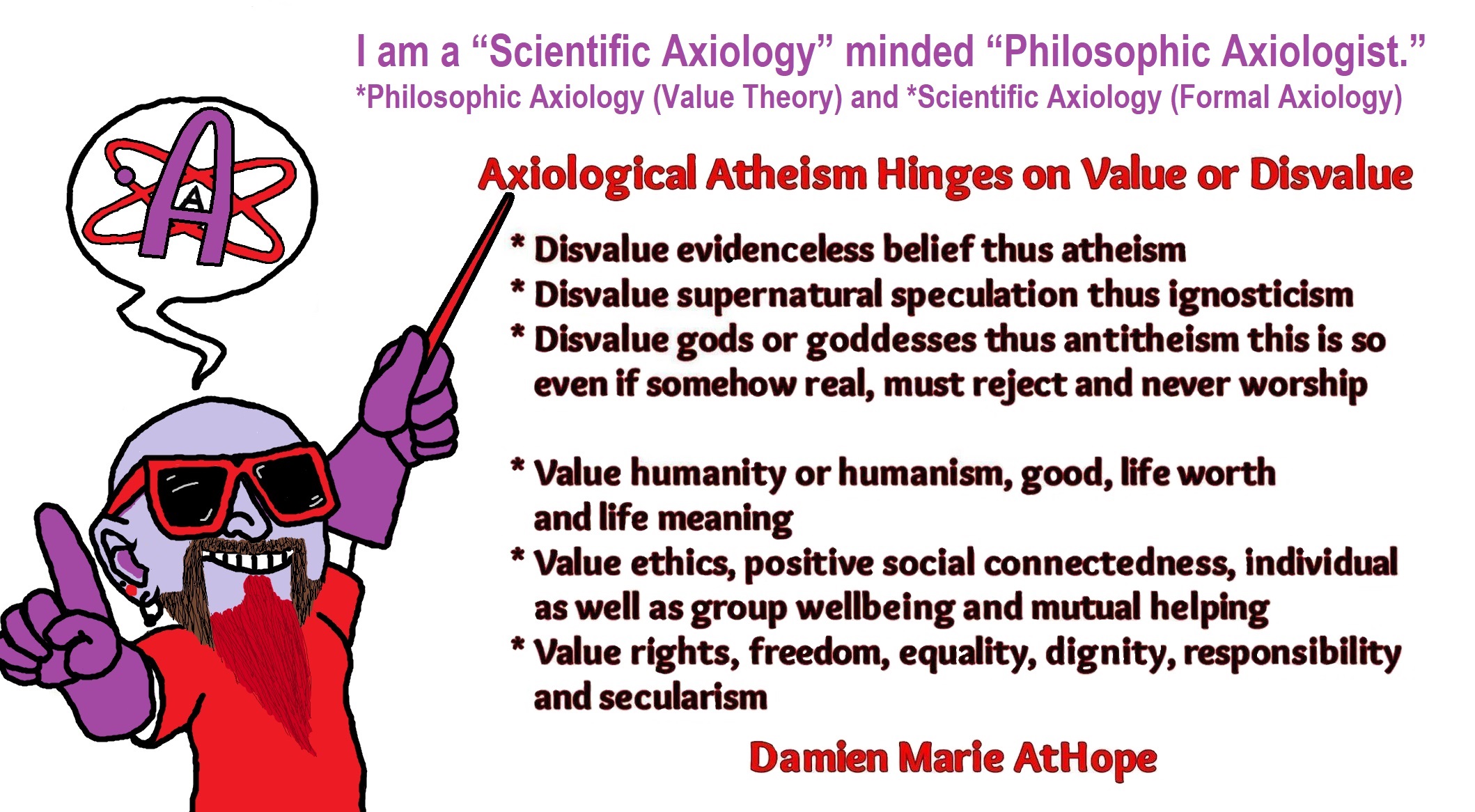
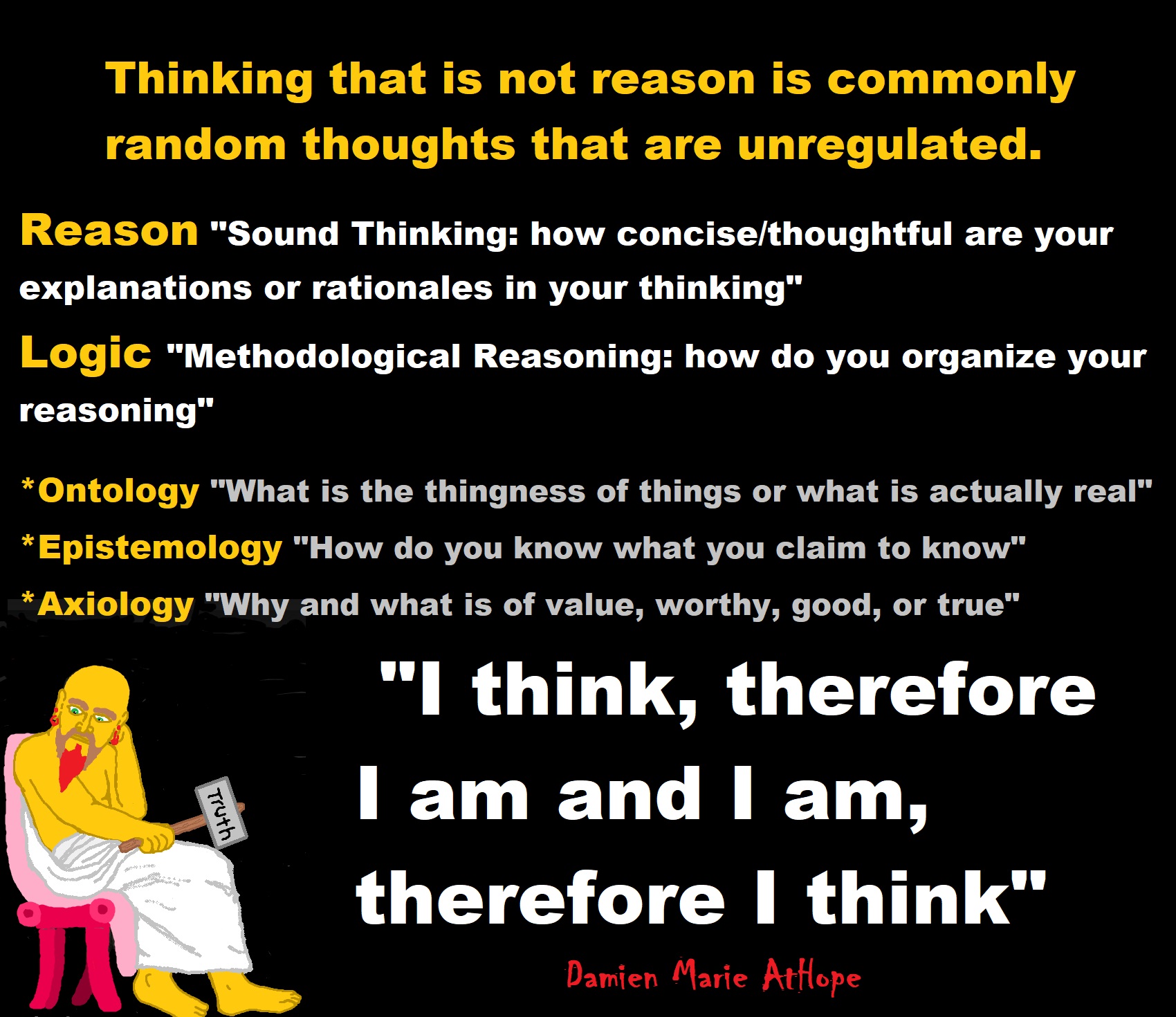
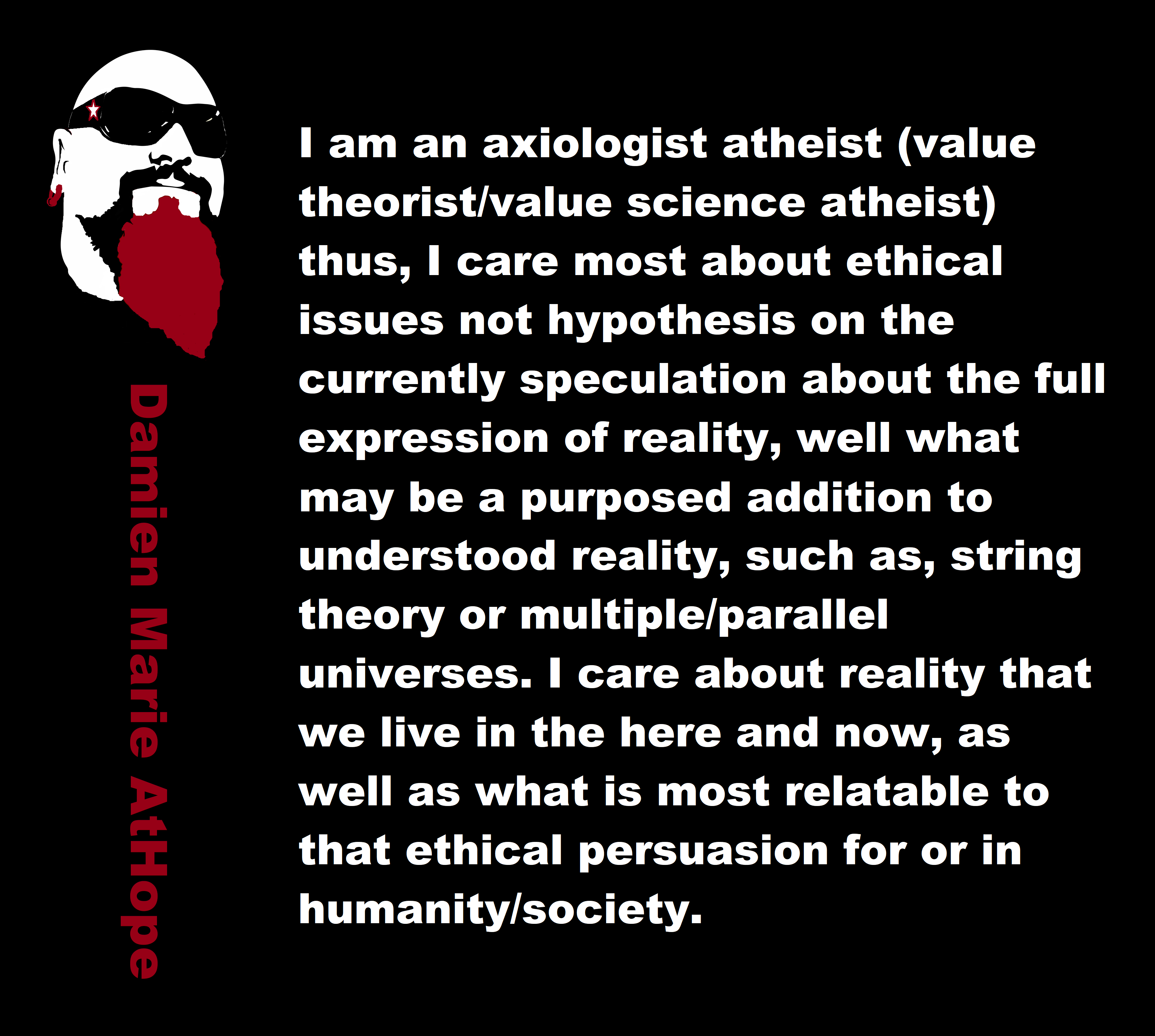
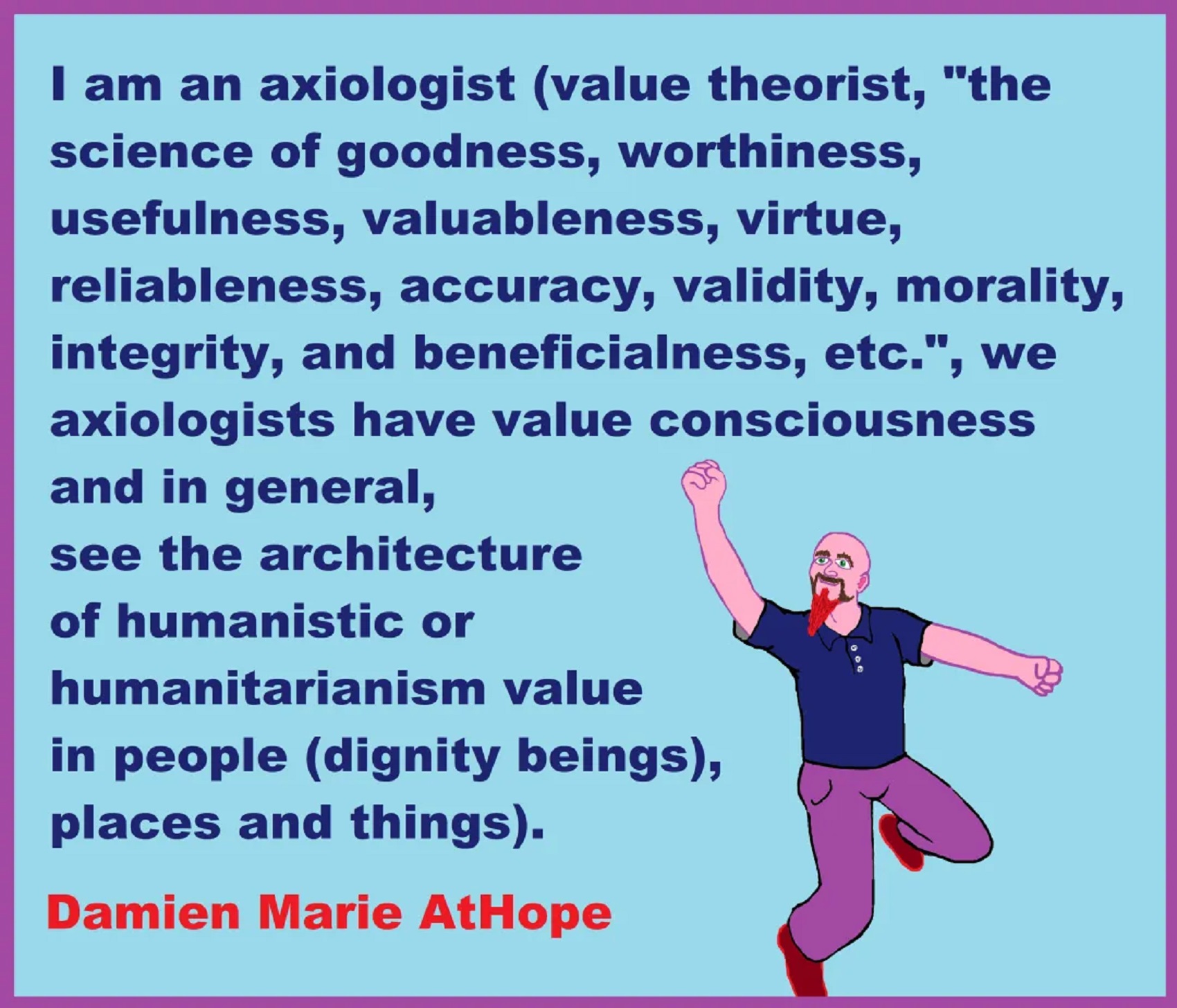
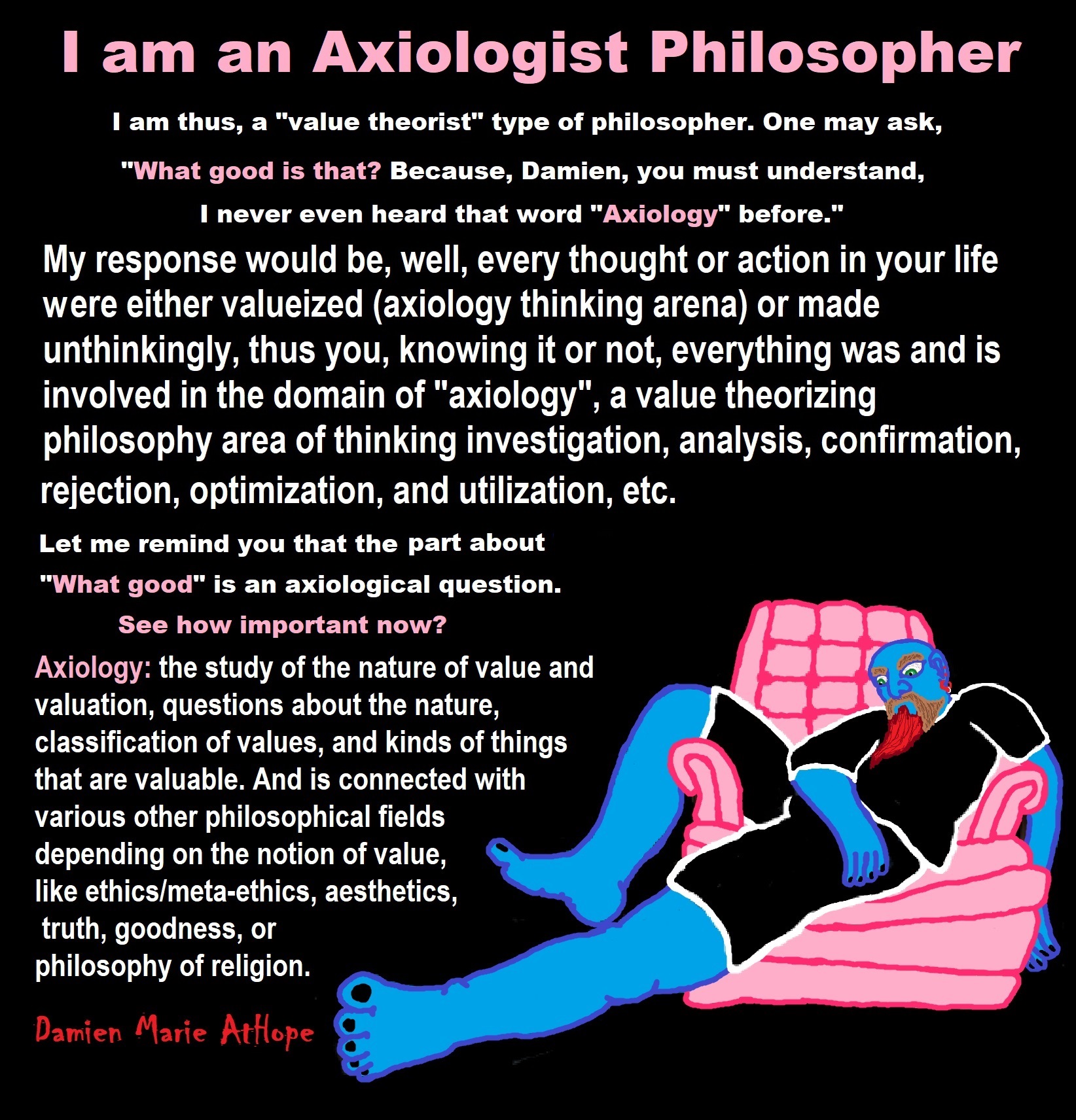

It is axiology thinking that truly helps in “is–ought” because the “is” was supposedly established by logic/rationalism and empiricism, these are both internal and external or said differently there represent “Reason and Evidence” and this is not a closed system, neither is confirming an “ought.”
A belief is a concept of acceptance of something as accurate to its properties or proposals offered. Truth rather than some fixed thing is at times but a guess, later shown accurate thus labeled knowledge or possibly seen as wrong in the sunlight of new information, requiring correction. All people wanting to have others take their ideas as serious, must offer a good justification built on reason and evidence.
I fully enjoy the value (axiology) of archaeology (empirical evidence from facts or artifacts at a site) is knowledge (epistemology) of the past, adding to our anthropology (evidence from cultures both the present and past) intellectual (rational) assumptions of the likely reality of actual events from time past.
Axiological Atheism Explained
If a god anything was real and good it would not be the harmful world we have. Therefore, no god is good but as gods are often claimed as good so no such gods exist. This is an axiological atheist argument also called the argument from evil.
Axiological/axiology (value theory/value science) atheism?
“Axiological Atheism can be thought to involve ethical/value theory reasoned and moral argument driven apatheism, ignosticism, atheism, anti-theism, anti-religionism, secularism, and humanism.”
My quick definition of Axiology?
Axiology is a philosophy (value theory) and a social science (formal axiology) mainly involving the “what, why, and how” of “value” the way epistemology approaches “knowledge” as in what is of value/good/worth/beneficial/ or useful? Why is the thing in question of “value/good/worth/beneficial/ or useful?” How should the value/good/worth/beneficial/ or useful” be interacted with?
Axiological atheism can be thought to involve ethical/value theory reasoned and moral argument driven apatheism, ignosticism, atheism, anti-theism, anti-religionism, secularism, and humanism. The valuations move up the latter as the levels of evaluation is made to value judge all the elements to better understand the value or disvalue available to reach the most accurate valuation reasonable with a sound aware value conciseness. Axiological atheism can be thought to involve Ethical Atheism.
1. Apatheism: we are born and by the fact reality is devoid of magic removes theological desires to understand the obvious naturalistic world, until we learn otherwise. (a “presumptive-value” failure, thus no motivation to adequately start the evaluation needed to understand if there is real value for an Axiology assessment to accurately place it in the value hierarchy). = no value
2. Ignosticism: Sees theological arguments and language as equivocation, contradictory, and/or un-cognitively relatable other than emotionalism or the like. I see Ignosticism as using the Theological non-cognitivism arguments of “mind understanding issues” (rationalism challenging) and an evidentialist/verificationist arguments of “lacking evidence issues” (empiricism challenging). As an atheist, I am a person who disbelieves or lacks belief in the existence of god or gods. In my non-belief, I am also ignostic feeling that every theological position assumes too much about the concept of god(s).
As an ignostic, I am a person who rational no idea of anything from reality whatever to label as “a concept of god” thus I can say I have no idea of anything that can connect to the term god and no reason to think anyone else can either. (again a “presumptive-value” failure, no good Ontology of the thing for Identifying values that could influence belief but without what is needed to understand if there is real value for an axiology assessment to accurately place it in the value hierarchy). = no value
3. Atheism: How can we not reject the concept of gods, aka: supposed supreme magical beings, when not even some simple magic is supported in reality. So how then is it not even more ridiculous to claim some supreme magic aka: gods which are even further from reality. May I remind you that faith in the acquisition of knowledge is not a valid method worth believing in. Because, what proof is “faith”, of anything religion claims by faith, as many people have different faith even in the same religion?
As an atheist, I am a person who disbelieves or lacks belief in the existence of god or gods. In my non-belief, I am also ignostic feeling that every theological position assumes too much about the concept of god(s). As an ignostic, I am a person who rational no idea of anything from reality whatever to label as “a concept of god” thus I can say I have no idea of anything that can connect to the term god and no reason to think anyone else can either. Atheists talk about gods and religions for the same reason doctors talk about cancer, they are looking for a cure or a firefighter talking about fires because they burn people and they care to stop them.
We atheists too often feel a need to help the victim’s of mental slavery, held in the bondage that is the false beliefs of gods and the conspiracy theories of reality found in religions. If you think you believe in a god, “what do you mean by god,” saying a name tells me not one thing about the thing I am asking to know “its” beingness / thingness / attributes / qualities. Thus, what is the thing “god” to which you are talking about and I want you to explain its beingness /thingness / attributes/ qualities? Religious/theistic people with supernatural beliefs often seem as though they haven’t thought much about and that is something we can help using ontology questions about the beingness / thingness / attributes/ qualities they are trying to refer too. What do you mean by god, when you use the term god? And, I am not asking you for the name you attach to the thing you label as a god. I don’t need to know what the god you believe is known “by.” I am asking, what is the thing you are naming as a god and what that thing is, its qualities in every detail like all things have if they are real.
Are you just making stuff up or guessing/hoping or just promoting unjustified ideas you want to believe, what is a god? As an atheist, I feel more wonder than I did as a theist because I thought, “big deal” to any wonder I experienced, thinking god could do anything. So with such an unrealistic mindset, everything lost its wonder but it’s the opposite as an atheist. As a theist, the world was full of superstitions and supernatural magic possibilities and thus utilized thinking that was not in the real world. As an atheist all I have now is the real world, not that all atheists seem to get this, we all are in a real world devoid of magic anything, therefore, everything adds to my feeling of awe. There should be little debate with atheist acknowledging discernable reality compared to theists with non-reality claims. Yes, I have way more awe and wonder as an atheist than I ever had as a theist because as a theist anything was possible with god. Therefore, as a theist things where not that amazing.
However, as an atheist grasping what an absolute accidental or how random things are, with a 95 to 99 % of all life ever existing on this planet went extinct. I am thoroughly amazed we are even here the evolved children of ancient exploded stars, likely born in galaxies born in super-massive black holes, it’s all amazing. There is no evidence for Gods. But is their proposition outside of reason? As always start in reality from the evidence we do know, such as never in the history of scientific research or investigation has any supernatural claims shown to be true. So it is completely outside of possibility and is utterly ridiculous.
Therefore, belief should be rejected as there are no warrants at all and it is axiologically unworthy to such a preponderance to demand disbelief. (yet again a “presumptive value” failure, no good Ontology of the thing not the cognitively meaningful claims relatable to reality that must be attached to all magic and gods claims for Identifying values that could influence belief but without what is needed to understand if there is real value for an axiology assessment to accurately place it in the value hierarchy).
4. Antitheism: Anti-theism requires more than either merely disbelieving in gods or even denying the existence of gods. Anti-theism requires a couple of specific and additional beliefs: first, that theism is harmful to the believer, harmful to society, harmful to politics, harmful, to culture, etc.; second, that theism can and should be countered in order to reduce the harm it causes. If a person believes these things, then they will likely be an anti-theist who works against theism by arguing that it be abandoned, promoting alternatives, or perhaps even supporting measures to suppress it. It’s worth noting here that, however, unlikely it may be in practice, it’s possible in theory for a theist to be an anti-theist.
This may sound bizarre at first, but remember that some people have argued in favor of promoting false beliefs if they are socially useful. To me, I think many may have a misconception of the term. Atheism and anti-theism so often occur together at the same time and in the same person that it’s understandable if many individuals fail to realize that they aren’t the same. Making a note of the difference is important, however, because not every atheist is anti-theistic and even those who are, aren’t anti-theistic all the time. Atheism is simply the absence of belief in gods; anti-theism is a conscious and deliberate opposition to theism.
Many atheists are also anti-theists, but not all and not always. To me as an antitheist, I see the concept of gods antihumanistic and wholly harmful to a free humanity and if the so-called gods somehow do end up being real that I will switch to direct opposition as I would any tyrant oppressing humanity. Antitheism (sometimes anti-theism) is a term used to describe an opposition to theism. The term has had a range of applications and definitions. In secular contexts, it typically refers to direct opposition to the validity of theism, but not necessarily to the existence of a deity. As an anti-theist, I am a person who is active in opposition to theism: both the concepts of god(s) as well as the religions that support them.
This is because theistic concepts and theistic religions are harmful and that even if theistic beliefs were true, they would be undesirable. (And, again a “presumptive value” failure, of the other value challenges of the lesser evaluations and value judgments addressed in the apatheism, ignosticism, atheism value judgment conclusion and an Axiological Atheism assessment of the god concept that must be attached to all magic and gods claims Identifying a lack of value and/or disvalue that influence harm to real value in an axiology assessment to accurately place its value violations in the value hierarchy).
5. Antireligionism: Not just Atheist, axiological atheists should be antitheists but this generally will involve anti-religionism. it would generally thus hold anti-religionist thinking. Especially, I am an anti-religionist, not just an atheist, and here is why summed up in three ideas I am against. And, in which these three things are common in all religions: “pseudo-science”, “pseudo-history”, and “pseudo-morality”. And my biggest thing of all is the widespread forced indoctrination of children, violating their free choice of what to not believe or believe, I hate forced hereditary religion. And my biggest thing of all is the widespread forced indoctrination of children, violating their free choice of what to not believe or believe, I hate forced hereditary religion. As well as wish to offer strong critiques regarding the pseudo-meaning of the “three letter noise” people call “G.o.d” (group originated delusion)!
As an anti-religionist, I am a person who can look at religion on the whole and see it is detrimental to the progress of humanity thus am in opposition to all and every religion, not even just opposition to organized religion. In case you were wondering, I am anti-pseudoscience, anti-supernatural, and anti-superstition as well. May I not be a silent watcher as millions of children are subjugated almost before their birth let alone when they can understand thought and are forcibly coerced, compelled, constrained, and indoctrinated in the mental pollution that religion can be. My main goal against religion is to fully stop as much as possible forced indoctrination, one could ask but then why do I challenge all adults faith?
Well, who do you think is doing the lying to children in the first place. End Hereditary religion, if its a belief let them the equal right to choose to believe. “Religion is an Evolved Product” and Yes, Religion is Like Fear Given Wings… (And, one last time a “presumptive value” failure, of the other value challenges of the lesser evaluations and value judgments addressed in the apatheism, ignosticism, atheism value judgment conclusion and an Axiological Atheism assessment of the god concept and anti-theism assessment of the god show not just a lack of value but a possibly or likely harm demonstrating bot just a lack of value but a real disvalue and that includes the religions potentially removing value in an axiology assessment to accurately place it in the value hierarchy).
6. Secularism: is the only honorable way to value the dignity of others. If it was not true that there is a large unequal distribution of religion contributing to violence then there would be equal religion and atheist secularism violence. You do not see atheists bombing agnostics the very idea is laughable however even different branches of the same religion do will and have killed one another. So, violence not who we are it’s something we need to be compelled to do. Therefore, please support secularism.
We are all one connected human family, proven by DNA showing we should treat each other as fellow dignity beings, supported equally (no gods and no masters). States may often have powers, but only citizens have the glue of morality we call rights. And, as they say, in my “dream society”, lots of things are free (aka. planting free food everywhere, free to everyone); but I wonder what you mean when people say you can’t just let things be free, I think, yeah, how can I take free stuff from a free earth.
If one observes the virtues of (T. R. U. E. “The Rational Universal Ethics” or “The Responsible Universal Ethics”) that connect to all things as that of the connectedness equality like those which mirror the rays of the sun, fall down equally with a blind but fair indifference. (what is being expressed is that this sun shining will not favor one over another, no, the same upon everyone offering its light to all plant, animal, human, women, men, single or married, homosexual, bisexual, heterosexual, nonreligious, religious, people of means and those without, able-bodied and those which special needs, people of color, and those who are not, those with access to resources and those which out, young and elderly, etc.) All who wish to follow T. R. U. E. thus embodying a universalize equalitarian standard of ethics should strive to be like a ray of connected light to the world, shining equally and freedom to all of the world.
By such efforts a nonbiased unitive ethical approach is possible, one would have an increase in positive feelings to help others understanding equalitarian connectedness. If you don’t think different you will not behave differently, if you have never lived differently it is hard to see things differently and if you do not strive to understand difference one is thus unknowingly or not bound by limited encapsulation.
I am for a Free Secular Society. I am not for oppression or abuse of religious believer and want a free secular society with both freedoms of religion and freedom from religion. Even though I wish the end of faith and believing in myths and superstition, I wish this by means of informing the willing and not force of the unwilling. I will openly challenge and rebuff religious falsehoods and misunderstanding as well as rebuke and ridicule harmful or unethical religious ideology or behavior.
7. Humanism: is the philosophic thinking that humans can solve human problems by human means, without feeling a need to appeal to the likes of holy books, mystical anything, nor the belief in gods or religions. But, instead, aspires to a true belief in humanity, viewing it with a persuasion of equality. This caring realist thinking found in humanism utilizes an unstated assumption or aspiration, to do no harm as much as possible and to do good whenever one can.
Moreover, we are all one connected human family, proven by DNA showing we should treat each other as fellow dignity beings, supported equally. And, no one really owns the earth, we may make claims to it even draw lines on maps thinking this makes the fantasy borders, illusion supported by force and the potential for threat. Thus the ethical truth is we need to share the earth as communally as possible. And use the resources as safe and ethically as possible striving towards sharing and caring. (do no Harm and do good = Humanism). My core definition of humanism is that humans can solve human problems by human means.
I am not saying other things can’t or shouldn’t be added to it but to me, a definition of humanism must always contain something coherent to such a thinking or not contradict such as I have offered. Thus, why it is appropriate to say “good without god” when one is a humanist.
- My Atheism: “Axiological Atheism”
- Axiological Atheism, is Intellectualism
- “Value Theory/Value Science” atheism: AXIOLOGICAL ATHEISM
- Axiological Atheism not Nihilist Atheism
- Explaining Axiological theism, Axiological agnosticism, and Axiological atheism
- My quick definition of Axiology and Axiological Atheism?
- Axiological Atheism Morality Critique: of the bible god
- Axiological/axiology (value theory/value science) Atheism?
- Addressing “ATHEISM”, reasons for it and its possible types/styles
- Weak Theism and Weak Atheism being called Agnostic?
- Axiology, Morality and the Dignity Being: “Human Entity”
- Pragmatic Ethical/Axiology Driven Assumptions, Overcome the Weight of Solipsism Doubt
- Truth is a Value (axiological) Judgment.
- Methodological Rationalism (Ontology, Epistemology, & Axiology) and Skepticism
- I am an Axiological Atheist, with a Rationalist Persuasion, who Supports Anarcho-Humanism
- If axiology is a value-based ethics system, how are the ethical values established?
- “Value Theory/Value Science” atheism: AXIOLOGICAL ATHEISM
- Is bible god ethical? & Would It Be Bad or Good if God Exists? (axiological “value theory” questions)
- Axiology is both a philosophy and a science of value.
- Moral fear and Moral love (which together motivate my axiological ethics)?
- Axiological Dignity: “Value Consciousness vs Value-Blindness”
- Axiological Morality Critique of Pseudo-Morality/Pseudomorality?
- As an Axiological Atheist, I wish for Human flourishing
- Axiological Atheist “Damien” Live at 25 MeetUps: Atheist Reality TV
- Ontology, Epistemology, & Axiology argument/challenge protocol
- “The Hammer of Truth” (scientific philosophy: Ontology, Epistemology, & Axiology) in action.
- Hammer of Truth: Yes, you too, have lots of beliefs…
- Axiology, Naturalism, Realism and Moral Theory Ideas
- Using Axiological Awareness to Assist in Argumentation.
- Interview of Formal Axiological Atheist Dr. William Kelleher
- Trying to Help Promote Knowledge: Philosophy and Science.
- Value-blindness Gives Rise to Sociopathic evil.
- Here is a Little on how I got into Axiology
Axiological atheism
- I am an Axiological Atheist?
- Axiology and Value Consciousness
- On the Nature of Value (axiology)
- Axiological Ethics not Pseudo Morality
- Archie John Bahm: “Axiologist Humanist”
Applying Axiological Thinking
Philosophic Axiology (value theory) and Scientific Axiology (formal axiology)
Formal Axiology: Another Victim in Religion’s War on Science
*(axiology as philosophy) value theory/the theory of values, meta-ethics/morality or aesthetics:
“Value theory encompasses a range of approaches to understanding how, why, and to what degree persons value things; whether the object or subject of valuing is a person, idea, object, or anything else. Intuitively, theories of value must be important to ethics. This investigation began in ancient philosophy, where it is called axiology or ethics.” Ref
*(axiology as science) formal axiology/the theory of values, meta-ethics/morality or aesthetics:
“Formal axiology is a branch of axiology in general. Axiology in general or “as such” as value theory in all its ramifications, ranging from meta-theory to ethics, aesthetics, logic, and any other dimension of human interest that involves questions of good and evil, right and wrong, correctness or incorrectness, beauty and ugliness, truth and falsity, and every other conceivable value issue, dimension, or interest.
Formal axiology, focuses initially upon the most formal features of human values, then upon applications of these formalities to the concrete details of what we value (values) and how we value (valuations).
Robert S. Hartman created a logically abstract (he would say “synthetic”) to features of all human values and valuations; the formal definition of “good” or “value,” which he regarded as the “axiom” of formal axiology — Good is concept (or standard) fulfilment, the three basic kinds of value, intrinsic, extrinsic, and systemic, the hierarchy of value, where the three basic kinds of value are themselves ranked with respect to their relative worth, an association of the three basic kinds of value with set theory and transfinite mathematics.” Ref
axiology/axiologist: noun, axiological: adjective, axiologically: adverb
Axiological “Presumptive-Value”
Your god myth is an Axiological “Presumptive-Value” Failure
I am an Axiological (value theorist) Atheist, and Claims of god are a Presumptive-Value failure. Simply, if you presume a thing is of value that you can’t justify, then you have committed an axiological presumptive value failure.
Axiological “presumptive-value” Success: Sound Thinker: uses disciplined rationality (sound axiological judgment the evaluation of evidence to make a decision) supporting a valid and reliable justification.
Axiological “presumptive-value” Failure: Shallow Thinker: undisciplined, situational, sporadic, or limited thinking (unsound axiological judgment, lacking required evidence to make a “presumptive-value” success decision) lacking the support of a needed valid and reliable justification.
Often I get disheartened to see that so many people can look at the unknown or that which is devoid of any and all understanding and claim to know that this is evidence for some god or another. How can they with all honesty even say that they somehow already know about an established scientific unknown, when all along it is what it ever was, which I will remind you, is currently holding a confirmed status of unknown. Thus, still fully intact as currently unknowable (I.e. you simply cannot justifiability claim that such unknown is god or evidence of god). What really is a god anyway? The term god equals mystery that is used to explain the mysterious leaving us with yet more mystery, thus explains nothing.
Claims of god are a Presumptive-Value failure. Simply, if you presume a thing is of value that you can’t justify, then you have committed an axiological presumptive value failure. Axiological “presumptive-value” Success: Sound Thinker: uses disciplined rationality (sound axiological judgment the evaluation of evidence to make a decision) supporting a valid and reliable justification.
“Ok, So basically, the difference between reasoning with evidence and without?” – Questioner
My response, Well with or without valid justification because of evidence. As in you can’t claim to know the value of something you can’t demonstrate as having good qualities to attach the value claim too so if you lack evidence of the thing in question then you cannot validate its value. So it’s addressing a kind of justificationism (uncountable) Theory of justification, An (philosophy standard) approach that regards the justification of a claim as primary, while the claim itself is secondary; thus, criticism consists of trying to show that a claim cannot be reduced to the authority or criteria that it appeals to.
Think of is as a use-matrix. If I say this is of great use for that, can you validate its use or value, and can I use this as a valid method to state a valid justification for my claims without evidence to value judge from? No, thus an axiological presumptive-value failure as a valid anything.
Theory of justification is a part of epistemology that attempts to understand the justification of propositions and beliefs. Epistemologists are concerned with various epistemic features of belief, which include the ideas of justification, warrant, rationality, and probability. Loosely speaking, justification is the reason that someone (properly) holds a belief. When a claim is in doubt, justification can be used to support the claim and reduce or remove the doubt. Justification can use empiricism (the evidence of the senses), authoritative testimony (the appeal to criteria and authority), or reason. – Wikipedia
“Presumptions are things that are credited as being true until evidence of their falsity is presented. Presumptions have many forms and value (Axiology) is just one. In ethics, value denotes the degree of importance of something or action, with the aim of determining what actions are best to do or what way is best to live (normative ethics), or to describe the significance of different actions. It may be described as treating actions as abstract objects, putting VALUE to them.
It deals with right conduct and living a good life, in the sense that a highly, or at least relatively high valuable action may be regarded as ethically “good” (adjective sense), and that an action of low value, or relatively low in value, may be regarded as “bad”. What makes an action valuable may, in turn, depend on the ethic values of the objects it increases, decreases or alters. An object with “ethic value” may be termed an “ethic or philosophic good” (noun sense). Values can be defined as broad preferences concerning appropriate courses of actions or outcomes. As such, values reflect a person’s sense of right and wrong or what “ought” to be.
“Equal rights for all”, “Excellence deserves admiration”, and “People should be treated with respect and dignity” are representatives of values. Values tend to influence attitudes and behavior and these types include ethical/moral values, doctrinal/ideological(religious, political) values, social values, and aesthetic values. It is debated whether some values that are not clearly physiologically determined, such as altruism, are intrinsic, and whether some, such as acquisitiveness, should be classified as vices or virtues.” ref, ref
“Sound thinking to me, in a general way, is thinking, reasoning, or belief that tends to make foresight a desire to be as accurate as one can with valid and reliable reason and evidence.”
Sound axiological judgment, to me, a “presumptive-value” success, is value judged opinions expressed as facts with a valid and reliable justification. In an informal and psychological sense, it is used in reference to the quality of cognitive faculties and adjudicational (relating to adjudication) capabilities of particular individuals, typically called wisdom or discernment. In a legal sense, – used in the context of a legal trial, to refer to a final finding, statement, or ruling, based on a considered weighing of evidence, called, “adjudication“.
Critical Thinking, What Does it Mean to Be Open to Learn?
Axiological Leftist
Axiological Atheist Interviews
Roughly understood “Axiological Atheism”
= Strong Disbelief as well as Strong Secularism and Humanism.
I am an Axiological Atheist, which roughly can be understood as a value theory or value science Atheist. Axiology to Atheism is also meant to denote an atheistic rejection of the existence of gods or supreme beings in favor of a “higher absolute” such as humanity, formal axiology, or naturalistic or universal ethical principles.
My stating a kind of “higher absolute” is not stating a belief in some absolute morality, instead it is meaning nothing but naturalistic human-centered morality is used or forms of valued good is derived from a rational thinking by humanity (Ie. humanity as the absolute source of ethics and values, and permits individuals to resolve moral problems without resorting to god myths or religious philosophies).
Axiological Atheism can be thought to involve ethical/value theory reasoned and moral argument driven atheism, anti-theism, anti-religionism, ignosticism, apatheism, secularism, and humanism. I am anthropocentric as an Axiological Atheist. I see humans value as above all other life’s value. Some say well, we are animals so they disagree with my destination. But how do the facts play out? So you don’t have any difference in the value of life?
So a bug is the same as a mouse, a mouse is the same as a dolphin, a dolphin is the same as a human, all to you have exactly the same value? Do you fight to protect the rights of each of them equally? And all killing of any of them is the same crime murder?
I know I am an animal but you also know that we do have the term humans which no other animal is classified. And we don’t take other animals to court as only humans and not any other animals are like us. We are also genetically connected to plants and stars and that still doesn’t remove the special class humans removed from all other animals. A society where you can kill a human as easily as a mosquito would simply just not work ethically to me and it should not to any reasonable person either.
Anthropocentrism (from Greek ánthrōpos, “human being”; and kéntron, “center”) the belief that considers human beings to be the most significant entity of the world and interprets or regards the world in terms of human values and experiences.
Formal Axiology (Scientific Axiology/Scientific Value Theory) takes a realistic, or fact-based, view of the world when assessing or understanding value/good/worth. Formal axiology understands that people have and act upon values. Scientific axiologists will seek to understand what those values are, and to analyze their structure. That empirical orientation is why scientific axiology can serve as the formal side of the yet to be developed value sciences. To illustrate this value realism, suppose a theist states they love god(s).
Since the science of value has an empirical orientation, a value scientist would see the theistic belief in god(s) not as some actual existing being, instead understand it as a conception in the mind of theist not anything realistic or fact-based. Ref
In my opinion, when it comes to the god concept, an axiological atheist would start with ignosticism which is rejecting the concept of gods because the god concept and the term god has no meaning nor anything, in reality, to attach its meaning too.
Thus, god is not any different than any other made up three words such as fod, nod, lod, vod, etc… which has no meaning as a real thing other than our attribution abstractions. If an axiological atheist were asked how important it is to disprove a god or even care about the god question, they would simply not care since the question is meaningless such as looking for an invisible pink unicorn or the jolly green giant.
Thus, an axiological atheist could be seen as using apatheism, unless they are under serious challenge or feeling a need to challenge theists or religion believers.
An axiological atheist would thus not believe in a god in anyway and likely, this would be called strong atheism. An axiological atheist is more than simply an atheist since axiological atheism sees the god concept as fake or not real and harmful to a free humanity. Therefore, an axiological atheist takes an active opposition to theism and their fake gods and even if some god(s) are found to somehow be real then an axiological atheist would start hating that real god and until then, they will hate all manmade god concepts.
Furthermore, an axiological atheist would most likely hate religions for some of the same reasons it opposes god(s) and thus, will be an anti-religionist who sees that religions on the whole to be harmful to humanity. However, an axiological atheist is not against people whether they believe in god concept or religion, they center their hate on harmful ideas such as gods or religions. This hate towards harmful ideas is motivated from a deep ethical care for humanity and thus involves humanism.
So, axiological atheism is a humanistic philosophical and ethical stance which emphasizes individually and collectively, the value and agency of human beings and prefers critical thinking and evidence (rationalism, empiricism) over any kind of established doctrines (holy books) or faith (fideism).
Moreover, even with axiological atheism’s extremely strong opposition to gods and religion, it does value every person’s self-right to define beliefs for themselves and thus, supports secularism (freedom for religion and freedom from religion), protects the religious and nonreligious as well as antireligious from governmental interference and protect the government from the religious, nonreligious as well as antireligious.
That being said axiological atheism would like beliefs in gods or religions to be demoted to where they are seen as little more than fantasy or myths but are somewhat harmful and certainly not safe for children.
Axiological atheism: (is thinking that a god’s existence to be a bad thing)
Axiological atheism is the thinking that no god(s) or goddess(es) exist and they lack all worth and value to humans even if they existed. Such myth should be rejected in favor of believing in humanity, seeing secularism and humanism as a kind of “higher absolute” or form of valued good. (Ie. humanity as the absolute source of ethics and values, and permits individuals to resolve moral problems without resorting to god myths or religious philosophies).
An axiological atheist could be thought of as thinking no gods no masters and thus would never worship a god or any being especially if it was by threat, force or the act of coercing to any extent. An axiological atheist may even question if any being is worthy of the title god or be ignostic that every theological position assumes too much about the concept of god and see this as extending to other theological concepts; including (but not limited to) concepts of faith, spirituality, heaven, hell, afterlife, damnation, salvation, sin and the soul.
Thus regarding that as ridiculous and not worthy at all and should be shown Ridicule and Disdain. Therefore as you can guess they would say we are better off that no god(s) or goddess(es) existed and it would be much worse if they did.
Axiological Atheist, can be understood as a value theory or value science Atheist.
As such axiological atheism’s ethically reasoning is constructive and pro-humanity. We who believe we are thinking rational, leading to opposition or hate of religion may that be limited to the nonfactual or oppressive ideology and not the people. Beyond just not being something lets be something, rational thinking should challenge myths but also prove our love for humanity and care for all living beings.
In most cases, Axiological atheism would assert the traditional concept of “Atheism” answers only a single question: Is there a creator god or not? That is an important question, but if your answer is “no”, it is only a starting point and not a way of life.
You may have reached that viewpoint based on your respect for logic, evidence, science,and personal experience which too are vital values. Yet, after you have reached that initial “no god” answer, all the other important questions in life, all the options for mental and emotional wholeness and social and environmental harmony, ethics and morality, personal fulfillment, social values, philosophy, and psychology remain open.
That is where “Axiological Atheism” holds a connection to both further challenging the god concept and devaluing religion and adding a value meaning and ethical axiological ideology to guide universally desirable secular ethical way of being or a value-driven life lived in this reality.
What is Axiology, Formal Axiology & Axiological Profiling?
Axiology is the name for “value theory.” It is derived from the Greek word “axios” meaning “worth.” Formal axiology is the logic-based science of value anchored in a “hierarchy of meaning” from the most meaningful or richest value to the most destructive or greatest value loss. The logic specifies 18 different levels of richness. Hartman’s “hierarchy of value” is the mathematical measuring standard for human evaluative judgment and decision-making in life and in all social sectors of life in our culture.
When people make value judgments, they use both their mental and emotional capacities to arrive at their decision. Some people have very solid and reliable decision-making abilities – while others routinely make wrong or inaccurate choices. Axiological profiles measure the quality of the respondent’s judgment and decision-making by gauging both their mental clarity and their emotional orientation & conditioning.
Dr. Leon Pomeroy in his book, The New Science of Axiological Psychology (Pomeroy, 2005), has shown that formal axiology is also empirically valid. Thus, in our axiological assessment profiles we have the solid support of both scientific methods: the deductive logic-based axiomatic method and the inductive, empirical method. Dr. Pomeroy spent over 20 years collecting statistical data for his book cross-nationally, from numerous and diverse eastern and western countries and cultures, and proving that cultures all over the world make value judgments in the same way.
Neuro‐Axiology: merges Neuroscience understanding how the brain works with Axiology’s formal science that makes possible the objective measurement of value how humans make value judgments. (You will ALWAYS choose what you think adds the MOST value to your life.) Accepting the standard of neuroscientific model of consciousness means that everything we think, feel, remember, and do is a function of the brain. This includes the emotion of empathy. We are not empathic because it makes sense to be empathic – meaning that most humans don’t simply reason their way to empathy. Nor do we simply learn empathy (although brain development is an interactive process with the environment, so we can’t rule out environmental influences). For the most part, we have empathy because our brains are wired with empathy as a specific function.
Like every function of the body you can think of, if it is not essential for survival then some subset of the human population likely has a disorder or even absence of this function. We recognize the biological limits of empathy or absence of empathy as the disorder, psychopathy. It is estimated that about 1% of the general population are psychopaths, while about 20-30% of the US prison population. Dr. Robert S. Hartman discovered that people hold back a 40% latent reserve of cooperation and productivity until they have been valued as human beings.
Axiology is the science of how humans value and make value judgments as well as how they relate to ethics (not moral values often religious or culture relative).
The basics of Axiology are in its 3 Classes of Value and 6 “Advisors”. The following are the Classes of Value:
1. Systemic: plans, rules, best practices, procedures; ideas or expectations
2. Extrinsic: practical or situational; measurable, tracked; tasks (tangible)
3. Intrinsic: personal or transcendent; infinitely valuable; irreplaceable; human beings (intangibles)
The following are the 6 Advisors which consist of 2 views of one inward and one outward and one must remember people are neither their thoughts nor their advisors.
1. World View: Empathy-Intuition “people”, Practical Judgment “tasks, & Systems Thinking “plans & ideas”
2. Self View: Self-Esteem “who you are”, Role Awareness “what you do,” & Self Direction “where you go”.
The word “Axiological” (to the term “Axiological atheism” is meant to denote an atheistic “Value” rejection of the existence of gods or supreme beings and in favor of a “higher absolute” such as humanity or universal ethical principles. The perception of moral obligation removed from ethical sensitivity to universal justice [is] thus unintelligible as “higher absolute”. As a form of atheism, Axiological favors humanity as the absolute source of holistic ethics and care values which permits individuals to resolve moral problems without resorting to a god’s moral obligation which is anti-humanity and not needing to connect to equal justice. Axiological Atheism can be seen as ethically reasoned antitheism and antireligionism where it is all about axiology values that underlie the universal truths.
A few examples of universal truths such as there is no such thing as just rape, no honorable thoughtful unwanted torture, and no just humanistic caring abuse of the innocent. You can offer excuses but the true values violations hold true. Axiologists are broadly concerned with all forms of value including aesthetic values, ethical values, and epistemic values.
In a narrow sense, axiologists are concerned with what is intrinsically valuable or worthwhile—what is desirable for its own sake. All axiological issues are necessarily connected to ontological and epistemological assumptions.
Axiology in Axiological Atheism can be seen as applying science of morality, referring to its ethically naturalistic views basing morality on rational and empirical consideration of the natural world. The idea of a science of morality has been explored by writers like Joseph Daleiden in The Science of Morality: The Individual, Community, and Future Generations or more recently by neuroscientist Sam Harris in the 2010 book The Moral Landscape.
Harris’ science of morality suggests that scientists using empirical knowledge, especially neuropsychology and metaphysical naturalism, in combination with axiomatic values as “first principles”, would be able to outline a universal basis for morality. Harris and Daleiden chiefly argue that society should consider normative ethics to be a domain of science whose purpose amounts to the pursuit of flourishing (well-being).
“Science” should not be so narrowly defined as to exclude important roles for any academic disciplines which base their conclusions on the weight of empirical evidence. The term “science of morality” is also sometimes used for the description of moral systems in different cultures or species.
The axiological movement emerges from the phenomenological method. The axiologists sought to characterize the notion of value in general, of which moral value is only one species. They argue against Kant, that goodness does not exclusively derive from the will, but exists in objective hierarchies. They emphasize the extent to which it is through emotions and feelings that human beings discern values. The notion of right action is understood derivatively in terms of the values which emotions reveal.
Evolutionary psychology seems to offer an account of the evolution of our “moral sense” (conscience) that dispenses with any reference to objective values. Its apparent elimination of objective values on the grounds of their being unneeded in explanation has led the skeptical writings of J.L. Mackie and Michael Ruse. By contrast, Robert Nozick has resisted this interpretation of evolution (1981) arguing that an evolutionary account of the moral sense can no more dispense with values than an evolutionary account of perception can dispense with perceptual objects objectively present in the world. Axiologists in contemporary ethics are Platonists such as Iris Murdoch and Neo-Kantian theorists such as John Rawls and Robert Nozick.
Tenets of Secular Ethics
Despite the width and diversity of their philosophical views, secular ethicists generally share one or more principles:
• Human beings, through their ability to empathize, are capable of determining ethical grounds.
• Human beings, through logic and reason, are capable of deriving normative principles of behavior.
• Human beings have the moral responsibility to ensure that societies and individuals act based on these ethical principles.
• Societies should, if at all possible, advance from a less ethical, less empathy, and unjust form to a more ethical, more empathy and just form.
I Am An Axiological Atheist?
Explaining Axiological theism, Axiological agnosticism, and Axiological atheism
My Facebook Page: Axiological Atheist
Knowledge of the world is derived by observation, experimentation, and rational analysis. Humanists find that science is the best method for determining this knowledge as well as for solving problems and developing beneficial technologies. We also recognize the value of new departures in thought, the arts, and inner experience—each subject to analysis by critical intelligence.
Humans are an integral part of nature, the result of unguided evolutionary change. Humanists recognize nature as self-existing. We accept our life as all and enough, distinguishing things as they are from things as we might wish or imagine them to be. We welcome the challenges of the future, and are drawn to and undaunted by the yet to be known.
Ethical values are derived from human need and interest as tested by experience. Humanists ground values in human welfare shaped by human circumstances, interests, and concerns and extended to the global ecosystem and beyond. We are committed to treating each person as having inherent worth and dignity, and to making informed choices in a context of freedom consonant with responsibility.
Life’s fulfillment emerges from individual participation in the service of humane ideals. We aim for our fullest possible development and animate our lives with a deep sense of purpose, finding wonder and awe in the joys and beauties of human existence, its challenges and tragedies, and even in the inevitability and finality of death. Humanists rely on the rich heritage of human culture and the lifestance of Humanism to provide comfort in times of want and encouragement in times of plenty.
Humans are social by nature and find meaning in relationships. Humanists long for and strive toward a world of mutual care and concern, free of cruelty and its consequences, where differences are resolved cooperatively without resorting to violence. The joining of individuality with interdependence enriches our lives, encourages us to enrich the lives of others, and inspires hope of attaining peace, justice, and opportunity for all.
Working to benefit society maximizes individual happiness. Progressive cultures have worked to free humanity from the brutalities of mere survival and to reduce suffering, improve society, and develop global community. We seek to minimize the inequities of circumstance and ability, and we support a just distribution of nature’s resources and the fruits of human effort so that as many as possible can enjoy a good life.
Humanists are concerned for the well being of all, are committed to diversity, and respect those of differing yet humane views. We work to uphold the equal enjoyment of human rights and civil liberties in an open, secular society and maintain it is a civic duty to participate in the democratic process and a planetary duty to protect nature’s integrity, diversity, and beauty in a secure, sustainable manner.
Thus engaged in the flow of life, we aspire to this vision with the informed conviction that humanity has the ability to progress toward its highest ideals. The responsibility for our lives and the kind of world in which we live is ours and ours alone.
Humanist Manifesto is a trademark of the American Humanist Association
© 2003 American Humanist Association
Axiological atheism: (Ethical/Value theory Reasoned and Moral Argument driven) Atheism, Anti-theism, Anti-religionism, and Secular Humanism. Roughly then axiological atheism = Strong Disbelief as well as Strong Secularism and Humanism
Here’s What Being Good Without God Actually Means
The Pew Research Center took a look at what people without a religious affiliation think is essential to morality.
In recent years, researchers have begun to study the moral practices of a relatively new and growing group within America’s religious landscape — the “nones.” Nones are people who, when asked to describe their religious affiliation, respond that they are atheist, agnostic, or “nothing in particular.” As of 2014, the nones, also known as the “unaffiliated,” are the second largest religious grouping in America, coming in just under evangelical Christians. As a whole, the unaffiliated tend to be less religious by the standards that surveyors have traditionally used to measure religiosity — attendance at worship services, for example, or daily prayer.
But if they’re not religious by these standards, how exactly are the nones approaching the question of what it means to be a moral person? Thanks to the Pew Research Center, we now have some data on this. In a recent report on religion in everyday life, the organization asked unaffiliated people whether 16 pre-selected beliefs and behaviors were essential, important but not essential, or not important to what they think it means to be a “moral person.” For the unaffiliated, honesty tops the list, with about 58 percent of the nones saying that “being honest at all times” was essential to being a moral person. When Harvard chaplain Greg Epstein heard that honesty came out on top, it made a lot of sense to him. As author of “Good Without God: What a Billion Nonreligious People Do Believe,” Epstein has spent a considerable amount of time thinking about what nonbelievers actually hold to be true about tolerance, community, and morality.
“Of course these are people who are interested in honesty and integrity,” Epstein told The Huffington Post. “[Because if you’re coming out as non-religious], then you probably feel a very strong pull, to tell the truth and to be honest with yourself and others about who you are.”
Epstein suggested that the act of coming out as a nonbeliever requires a good deal of soul searching and introspection. In a country like America, where the overwhelming majority of people belong to some sort of religion, and where statistics show most of the public has negative feelings towards people who don’t believe in God, Epstein said that there really isn’t any incentive or social pressure to come out as non-religious, or atheist, or agnostic. Some other essentials that the unaffiliated believe make a moral person are being grateful for what you have (53 percent), committing to spend time with family (47 percent), forgiving those who have wronged you (39 percent), and working to protect the environment (35 percent).
Beliefs and practices that have been traditionally used to measure religiosity fell near the bottom of the list. About 10 percent of the unaffiliated believe praying regularly is essential to being moral. Two percent believe attending religious services is part of a moral life. In an open-ended question, about a quarter (23 percent) of nones wrote that the “Golden Rule,” a behavior cited by Jesus in the Bible, was essential to morality.
For Epstein, the results of the Pew survey are evidence that the religiously unaffiliated community values action over belief in the supernatural. “[Humanist and nonreligious people] respect completely the fact that our religious neighbors also feel the need to pray, but our view is that action is irreplaceable,” Epstein said. “Actions ultimately make the difference between living a good life and not living a good life.”
No God: No evidence, No intelligence, and No goodness = Valid Atheism Conclusion
- No evidence, to move past the Atheistic Null Hypothesis: There is no God/Gods (in inferential statistics, a Null Hypothesis generally assumed to be true until evidence indicates otherwise. Thus, a Null Hypothesis is a statistical hypothesis that there is no significant difference reached between the claim and the non-claim, as it is relatively provable/demonstratable in reality some way. “The god question” Null Hypothesis is set at as always at the negative standard: Thus, holding that there is no God/Gods, and as god faith is an assumption of the non-evidentiary wishful thinking non-reality of “mystery thing” found in all god talk, until it is demonstratable otherwise to change. Alternative hypothesis: There is a God (offered with no proof: what is a god and how can anyone say they know), therefore, results: Insufficient evidence to overturn the null hypothesis of no God/Gods.
- No intelligence, taking into account the reality of the world we do know with 99 Percent Of The Earth’s Species Are Extinct an intelligent design is ridiculous. Five Mass Extinctions Wiped out 99 Percent of Species that have ever existed on earth. Therefore like a child’s report card having an f they need to retake the class thus, profoundly unintelligent design.
- No goodness, assessed through ethically challenging the good god assumptions as seen in the reality of pain and other harm of which there are many to demonstrates either a god is not sufficiently good, not real or as I would assert, god if responsible for this world, would make it a moral monster ripe for the problem of evil and suffering (Argument from Evil). God would be responsible for all pain as life could easily be less painful and yet there is mass suffering. In fact, to me, every child born with diseases from birth scream out against a caring or loving god with the power to do otherwise. It could be different as there is Congenital insensitivity to pain (CIP), also known as congenital analgesia, in which a person cannot feel (and has never felt) physical pain.[1]
Disproof by logical contradiction
‘A Logical Impossibility’
(especially in reductio ad absurdum arguments)
I am an Axiological (Theoretical and Normative VALUE Theorist philosopher) Atheist
The axiological atheism argument is deductively valid. Here is a proof of the validity of the argument: http://plato.stanford.edu/entries/evil/validity.html
“Issues in the Philosophy of Religion” is the viewpoint of a Roman Catholic philosopher Nicholas Rescher.
“Reasonable Faith“ is the viewpoint of a Catholic philosopher John Haldane.
This is an (pro-theism) axiological investigation. But good to understand how they use it wrong juxtaposition to Axiological Atheism: http://www.ryerson.ca/~kraay/theism.html
Axiological Atheism Morality Critique: of the bible god
Even the best thinking, beliefs, or ideas if not connected to action are but wasted words.
Any claimed god or supreme power that threatens extreme suffering to those who are vulnerable and of lesser power is abusive. This is especially so, with the human horror of injustice that would be hell. Which once created means its creator cannot also be called or connected to something all loving or all just.
Any reasonable person can know killing the entire planet in a flood if real which it is not would be the greatest act of mass murder, than that done by any other madman ever know in history.
Evil bible god?
There is plenty of evil in “the Good Book,” but here are some highlights:
1. God drowns the whole earth.
In Genesis 7:21-23, God drowns the entire population of the earth: men, women, children, fetuses, and perhaps unicorns. Only a single family survives. In Matthew 24:37-42, gentle Jesus approves of this genocide and plans to repeat it when he returns.
2. God kills half a million people.
In 2 Chronicles 13:15-18, God helps the men of Judah kill 500,000 of their fellow Israelites.
3. God slaughters all Egyptian firstborn.
In Exodus 12:29, God the baby-killer slaughters all Egyptian firstborn children and cattle because their king was stubborn.
4. God kills 14,000 people for complaining that God keeps killing them.
In Numbers 16:41-49, the Israelites complain that God is killing too many of them. So, God sends a plague that kills 14,000 more of them.
5. Genocide after genocide after genocide.
In Joshua 6:20-21, God helps the Israelites destroy Jericho, killing “men and women, young and old, cattle, sheep and donkeys.” In Deuteronomy 2:32-35, God has the Israelites kill everyone in Heshbon, including children. In Deuteronomy 3:3-7, God has the Israelites do the same to the people of Bashan. In Numbers 31:7-18, the Israelites kill all the Midianites except for the virgins, whom they take as spoils of war. In 1 Samuel 15:1-9, God tells the Israelites to kill all the Amalekites – men, women, children, infants, and their cattle – for something the Amalekites’ ancestors had done 400 years earlier.
6. God kills 50,000 people for curiosity.
In 1 Samuel 6:19, God kills 50,000 men for peeking into the ark of the covenant. (Newer cosmetic translations count only 70 deaths, but their text notes admit that the best and earliest manuscripts put the number at 50,070.)
7. 3,000 Israelites killed for inventing a god.
In Exodus 32, Moses has climbed Mount Sinai to get the Ten Commandments. The Israelites are bored, so they invent a golden calf god. Moses comes back and God commands him: “Each man strap a sword to his side. Go back and forth through the camp from one end to the other, each killing his brother and friend and neighbor.” About 3,000 people died.
8. The Amorites destroyed by sword and by God’s rocks.
In Joshua 10:10-11, God helps the Israelites slaughter the Amorites by sword, then finishes them off with rocks from the sky.
9. God burns two cities to death.
In Genesis 19:24, God kills everyone in Sodom and Gomorrah with fire from the sky. Then God kills Lot’s wife for looking back at her burning home.
10. God has 42 children mauled by bears.
In 2 Kings 2:23-24, some kids tease the prophet Elisha, and God sends bears to dismember them. (Newer cosmetic translations say the bears “maul” the children, but the original Hebrew, baqa, means “to tear apart.”)
11. A tribe slaughtered and their virgins raped for not showing up at roll call.
In Judges 21:1-23, a tribe of Israelites misses roll call, so the other Israelites kill them all except for the virgins, which they take for themselves. Still not happy, they hide in vineyards and pounce on dancing women from Shiloh to take them for themselves.
12. 3,000 crushed to death.
In Judges 16:27-30, God gives Samson strength to bring down a building to crush 3,000 members of a rival tribe.
13. A concubine raped and dismembered.
In Judges 19:22-29, a mob demands to rape a godly master’s guest. The master offers his daughter and a concubine to them instead. They take the concubine and gang-rape her all night. The master finds her on his doorstep in the morning, cuts her into 12 pieces, and ships the pieces around the country.
14. Child sacrifice.
In Judges 11:30-39, Jephthah burns his daughter alive as a sacrificial offering for God’s favor in killing the Ammonites.
15. God helps Samson kill 30 men because he lost a bet.
In Judges 14:11-19, Samson loses a bet for 30 sets of clothes. The spirit of God comes upon him and he kills 30 men to steal their clothes and pay off the debt.
16. God demands you kill your wife and children for worshiping other gods.
In Deuteronomy 13:6-10, God commands that you must kill your wife, children, brother, and friend if they worship other gods.
17. God incinerates 51 men to make a point.
In 2 Kings 1:9-10, Elijah gets God to burn 51 men with fire from heaven to prove he is God.
18. God kills a man for not impregnating his brother’s widow.
In Genesis 38:9-10, God kills a man for refusing to impregnate his brother’s widow.
19. God threatens forced cannibalism.
In Leviticus 26:27-29 and Jeremiah 19:9, God threatens to punish the Israelites by making them eat their own children.
20. The coming slaughter.
According to Revelation 9:7-19, God’s got more evil coming. God will make horse-like locusts with human heads and scorpion tails, who torture people for 5 months. Then some angels will kill a third of the earth’s population. If he came today, that would be 2 billion people.
Now, Christians have spent thousands of years coming up with excuses for a loving god that would allow or create such evil. In fact, they’ve come up with 12 basic responses, which are the subject of The Tale of the Twelve Officers.
You should also check out: evilbible.com (Link)
This website (evilbible.com), is designed to spread the vicious truth about the Bible. For far too long priests and preachers have completely ignored the vicious criminal acts that the Bible promotes. The so-called God of the Bible makes Osama Bin Laden look like a Boy Scout. This God, according to the Bible, is directly responsible for many mass-murders, rapes, pillage, plunder, slavery, child abuse , and killing, not to mention the killing of unborn children. I have included references to the Biblical passages, so grab your Bible and follow along.
It always amazes me how many times this God orders the killing of innocent people even after the Ten Commandments said Thou shall not kill. For example, God kills 70,000 innocent people because David ordered a census of the people (1 Chronicles 21).
God also orders the destruction of 60 cities so that the Israelites can live there. He orders the killing of all the men, women, and children of each city, and the looting of all of value (Deuteronomy 3). He orders another attack and the killing of all the living creatures of the city: men and women, young, and old, as well as oxen sheep, and asses(Joshua 6). In Judges 21 He orders the murder of all the people of Jabesh-gilead, except for the virgin girls who were taken to be forcibly raped and married. When they wanted more virgins, God told them to hide alongside the road and when they saw a girl they liked, kidnap her and forcibly rape her and make her your wife!
Just about every other page in the Old Testament has God killing somebody! In 2 Kings 10:18-27, God orders the murder of all the worshipers of a different god in their very own church! In total God kills 371,186 people directly and orders another 1,862,265 people murdered
The God of the Bible also allows slavery, including selling your own daughter as a sex slave (Exodus 21:1-11), child abuse (Judges 11:29-40 & Isaiah 13:16), and bashing babies against rocks (Hosea 13:16 & Psalms 137:9). This type of criminal behavior should shock any moral person.
Murder, rape, pillage, plunder, slavery, and child abuse can not be justified by saying that some god says it’s OK. If more people would actually sit down and read the Bible there would be a lot more atheists like myself. Jesus also promoted the idea that all men should castrate themselves to go to heaven: For there are eunuchs, that were so born from their mother’s womb: and there are eunuchs, that were made eunuchs by men: and there are eunuchs, that made themselves eunuchs for the kingdom of heaven’s sake. He that is able to receive it, let him receive it (Matthew 19:12). I don’t know why anyone would follow the teachings of someone who literally tells all men to cut off their privates.
The God of the Bible also was a big fan of ritual human sacrifice and animal sacrifice.
And just in case you are thinking that the evil and immoral laws of the Old Testament are no longer in effect, perhaps you should read where Jesus makes it perfectly clear: It is easier for Heaven and Earth to pass away than for the smallest part of the letter of the law to become invalid (Luke 16:17). There are many more quotes on this topic at myDo Not Ignore the Old Testament web page.
I know that most Christians believe that God is a good and loving god, and wants people to do good things. I believe that most people want to do good things and behave morally. I also believe that many Christians haven’t really read the Bible, or just read certain passages in church. This is understandable, as the Bible is hard to read due to its archaic language and obscure references. Also many priests and preachers don’t like to read certain passages in the Bible because they present a message of hate not love.
If you follow the links on this site you will learn about all the nasty things in the Bible that are usually not talked about by priests and preachers.
Want to know how I became an atheist, click the link: https://damienmarieathope.com/atheism/
Debunking Jesus?


Now, I am going to just assume for the sake of argument, such a human as jesus (could have possibly) existed. This does not mean I am sure even some human person now thought of as jesus ever existed.
Matthew 15:21-28
21 Leaving that place, Jesus withdrew to the region of Tyre and Sidon. 22 A Canaanite woman from that vicinity came to him, crying out, “Lord, Son of David, have mercy on me! My daughter is demon-possessed and suffering terribly.” 23 Jesus did not answer a word. So his disciples came to him and urged him, “Send her away, for she keeps crying out after us.” 24 He answered, “I was sent only to the lost sheep of Israel.” 25 The woman came and knelt before him. “Lord, help me!” she said. 26 He replied, “It is not right to take the children’s bread and toss it to the dogs.” 27 “Yes it is, Lord,” she said. “Even the dogs eat the crumbs that fall from their master’s table.” 28 Then Jesus said to her, “Woman, you have great faith! Your request is granted.” And her daughter was healed at that moment.
My Commentary Matthew 15:21-28
You believe you know Jesus. The lie called the bible is full of contradictions thousands of them so what you think you know depends on which lie you choose to remember. You do not know, you believe because of faith and think that feeling is knowing, but you are mistaken. You need to learn how to form justified beliefs, and faith is not it.
If Jesus was God, he would have sought worship for himself would he not? Since he didn’t, instead he sought worship for God in the heavens, therefore, he was not God. Verses in the Bible say Jesus is not God The Bible says that Jesus denied he is God.
Jesus spoke to a man who had called him ‘good,’ asking him, ‘Why do you call me good? No one is good except God alone.’ (Luke 18:19)
And he said to him, ‘Why are you asking me about what is good? There is only One who is good; but if you wish to enter into life, keep the commandments.’ (Matthew 19:17)
Jesus did not teach people that he was God. If Jesus had been telling people that he was God, he would have complimented the man. Instead, Jesus rebuked him, denying he was good, that is, Jesus denied he was God.
The Bible says that God is greater than Jesus.
‘My Father is greater than I’ (John 14:28)
‘My father is greater than all.’ (John 10:29)
Jesus cannot be God, if God is greater than him. The Christian belief that the Father and son are equal is in direct contrast to the clear words from Jesus. Jesus never instructed his disciples to worship him.
‘When you pray, say Our Father which art in heaven.’ (Luke 11:2)
‘In that day, you shall ask me nothing. Whatsoever you ask of the Father in my name.’ (John 16:23)
‘The hour cometh and now is, when the true worshippers shall worship the Father in spirit and in truth; for the Father seeketh such to worship him.’ (John 4:23)
Is Jesus equal to or lesser than god?
JOH 10:30 I and my Father are one.
JOH 14:28 I go unto the Father: for my Father is greater than I.
How did Simon Peter find out that Jesus was the Christ?
By a revelation from heaven (Matthew 16:17)
His brother Andrew told him (John 1:41)
Jesus’ last words?
MAT 27:46,50: “And about the ninth hour Jesus cried with a loud voice, saying, “Eli, eli, lama sabachthani?” that is to say, “My God, my God, why hast thou forsaken me?” …Jesus, when he cried again with a loud voice, yielded up the ghost.”
LUK 23:46: “And when Jesus had cried with a loud voice, he said, “Father, unto thy hands I commend my spirit:” and having said thus, he gave up the ghost.”
JOH 19:30: “When Jesus therefore had received the vinegar, he said, “It is finished:” and he bowed his head, and gave up the ghost.”
Jesus’ first sermon plain or mount?
MAT 5:1,2: “And seeing the multitudes, he went up into a mountain: and when he was set, his disciples came unto him: And he opened his mouth, and taught them, saying….”
LUK 6:17,20: “And he came down with them, and stood in the plain, and the company of his disciples, and a great multitude of people…came to hear him.. And he lifted up his eyes on his disciples and said…”
Whom did they see at the tomb?
MAT 28:2 And, behold, there was a great earthquake: for the angel of the Lord descended from heaven, and came and rolled back the stone from the door, and sat upon it.
MAT 28:3-5 His countenance was like lightning, and his raiment white as snow: and for fear of him the keepers did shake, and became as dead men. And the angel answered and said unto the women, Fear not ye: for I know that ye seek Jesus, which was crucified.
MAR 16:5 And entering into the sepulchre, they saw a young man sitting on the right side, clothed in a long white garment; and they were affrighted.
LUK 24:4 And it came to pass, as they were much perplexed thereabout, behold, two men stood by them in shining garments:
JOH 20:12 And seeth two angels in white sitting, the one at the head, and the other at the feet, where the body of Jesus had lain.
Jesus descended from which son of David?
Solomon (Matthew 1:6)
Nathan(Luke3:31)
Would Jesus inherit David’s throne?
Yes. So said the angel (Luke 1:32)
No, since he is a descendant of Jehoiakim (see Matthew 1: I 1, I Chronicles 3:16). And Jehoiakim was cursed by God so that none of his descendants can sit upon Davids throne (Jeremiah 36:30)
When Jesus met Jairus was Jairus daughter already dead?
Yes. Matthew 9:18 quotes him as saying, My daughter has just died.
No. Mark 5:23 quotes him as saying, My little daughter is at the point of death.
Did Herod think that Jesus was John the Baptist?
Yes (Matthew 14:2; Mark 6:16)
No (Luke 9:9)
Did John the Baptist recognize Jesus before his baptism?
Yes (Matthew 3:13-14)
No (John 1:32,33)
Did John the Baptist recognize Jesus after his baptism?
Yes (John 1:32, 33)
No (Matthew 11:2)
I could go on there is much more but some will say I am using man’s wisdom not god’s mysterious ways. So, is the bible in favour of wisdom? Is it folly to be wise or not?
PRO 4:7 Wisdom is the principal thing; therefore get wisdom: and with all thy getting get understanding.
ECC 1:18 For in much wisdom is much grief: and he that increaseth knowledge increaseth sorrow.
1CO 1:19: “For it is written, I will destroy the wisdom of the wise, and will bring to nothing the understanding of the prudent.”
I hear all the time but did you read the bible?
Read the bible, you mean the book of dogmatic propaganda. Yes sadly I have. I read two versions of the bible King James and NIV. I have read history, anthropology and archeology of world religions and understood right thinking because of philosophy. I know a lot, I dont claim to know everything but certainly enough to firmly know religion and gods are myths. I could list countess scriptures to contradict the bible’s credibility (it has none) as I have listed some but true believers will believe as they wish (blind faith). The male god is an invented idea no more than 5,000 years the female goddess at least 12,000 but the first worship was and the world’s oldest ritual was of a large stone python 70,000 years ago. https://www.apollon.uio.no/english/articles/2006/python-english.html
You may think it’s only me that thinks god is a lie but you should know the National Academy of Science charted belief in God as low as 5.5 percent among biologists and 7.5 percent among physicist and astronomers. http://www.nbcnews.com/id/12082681/ns/health-heart_health/t/power-prayer-flunks-unusual-test/#.VpBgrPkrKM8
Why is it important what people believe?
We atheists are largely science positive and often pro humanist; many atheists are the ones doing the science and caretaking the environment, while there are christians often putting large amounts of effort praying for change, or praying for the end. Prayer so you know is proven to fail. In the largest study of its kind, researchers found that having people pray for heart bypass surgery patients had no effect on their recovery. In fact, patients who knew they were being prayed for had a slightly higher rate of complications. http://www.nbcnews.com/id/12082681/ns/health-heart_health/t/power-prayer-flunks-unusual-test/#.VpBgrPkrKM8
I hear christians say over and over, I will pray for you!!
True Believers (blind faith), you believe in prayer then pray for starving children like in parts of africa that god seems to care nothing about, not me who has committed the only unforgivable sin of blasphemy the holy spirit. Jesus Himself said in Matthew 12:31, “Therefore I say to you, every sin and blasphemy will be forgiven men, but the blasphemy against the Spirit will not be forgiven men.”
And, I know you True Believers think I must never have known jesus or been a true christian or I would not be an atheist. Ridiculous….
I was raised Christian though did not take it serious at first until I got sober off drugs and alcohol from then I was a devout Christian from 17 until 36. At 36 while going to college to be a drug and alcohol counselor then I had to do take classes on religion and after learning the truth I turned atheist. By the way True Believers if you want to learn an accurate account on how Christianity began?
Click the link: https://damienmarieathope.com/2016/01/07/accurate-account-on-how-did-christianity-began/
Which is more reasonable, Atheism or Christianity?
Atheism is more reasonable as it is only holding to the proven naturalism confirmed by science. Whereas, Christianity puts forth magical thinking and stories about the history of the world, who’s beliefs either dont match or are debunked by the proven naturalism confirmed by science.

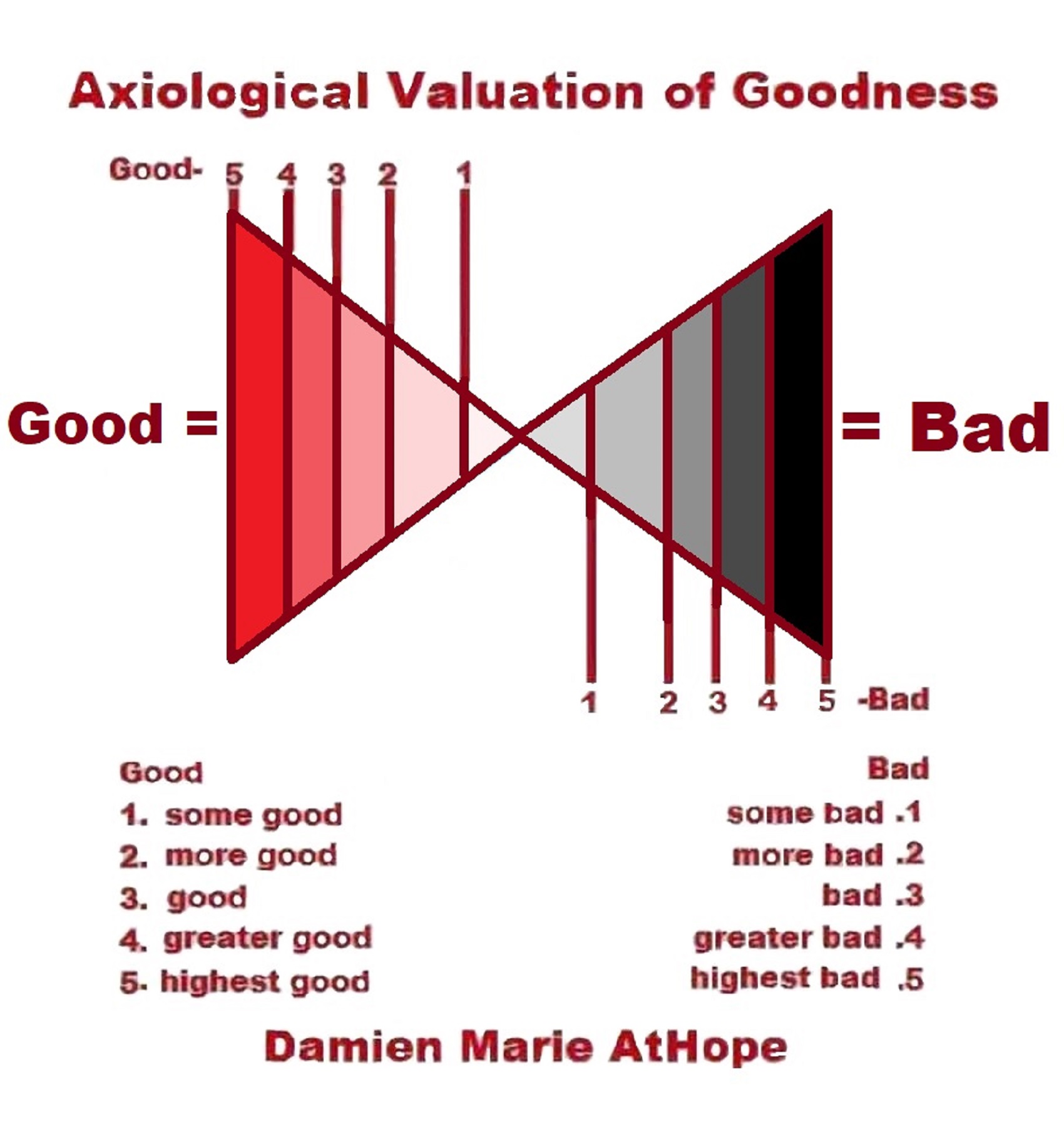
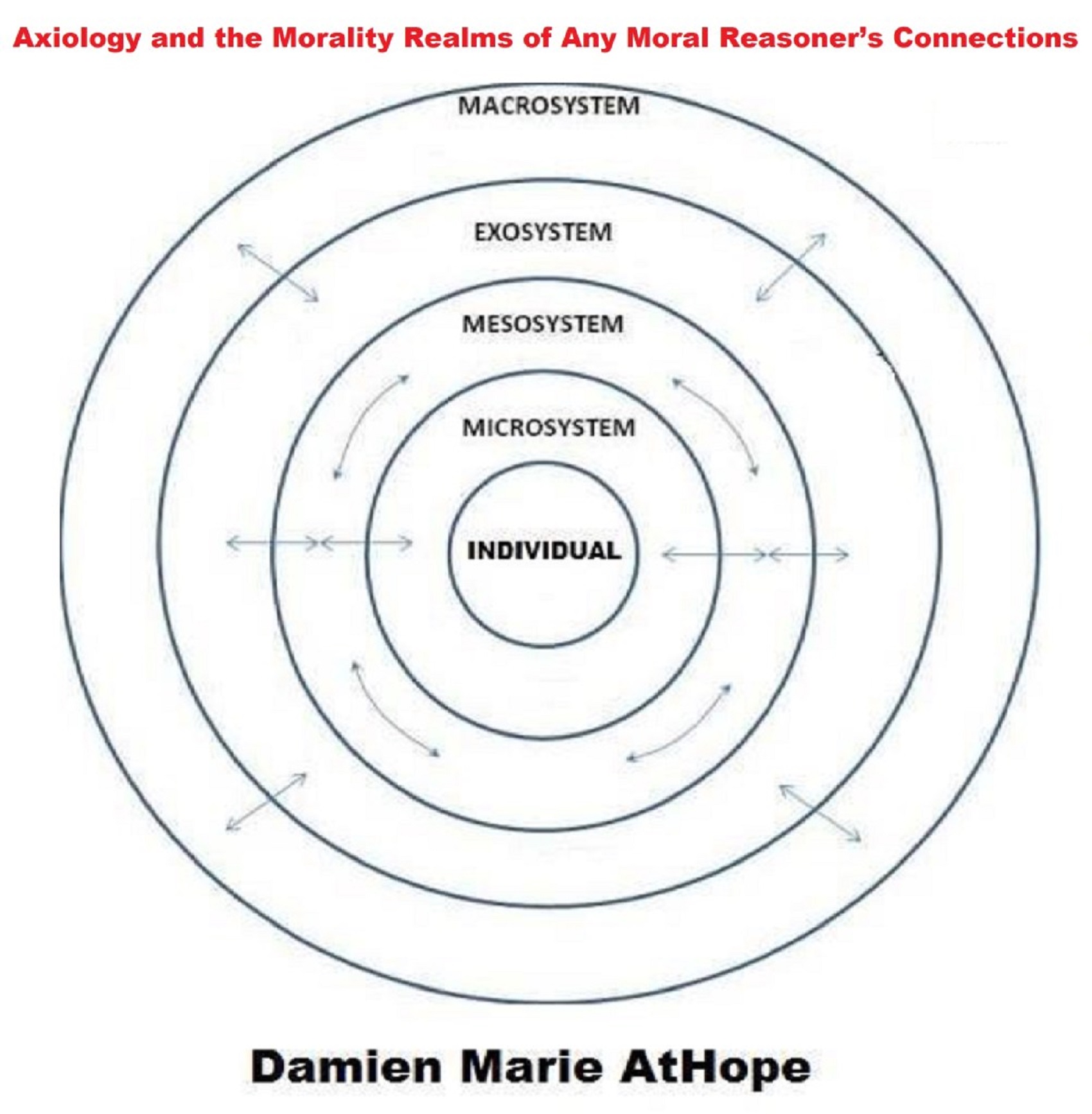
Axiology and the Morality Realms of Any Moral Reasoner’s Connections
Reasoned Axiological thinking on morality realms, of any moral reasoner’s connections, and the moral weight they could motivate or affect in any assessed or concluded valuation, they use in making an ultimate choice of behavior. The axiological Valuation approach to moral decision-making would likely use an Ecological Systems Theory modal. And in order to conceptualize “value” you need to understand the environmental contexts, five ecological systems:
- Individual: This is usually the highest value, though for some people, family members may have the same or higher value than themself.
- Microsystem: This usually the next highest value is placed with the closest relationships to an individual and encompasses interpersonal relationships and direct interactions with immediate surroundings, for example, family members or friends of friends.
- Mesosystem: This usually includes close to semi-close relationships, for example, family friends or friends of friends.
- Exosystem: This usually only involves things such as semi or not directly involved individuals, for example, people at one’s job, people at places you frequent, then moving out and lessening in assessed value as it goes to further removed or extended networks of connectedness or relatedness. Such as the likely value distinctions in the value of the people in one’s city, the people in one’s state, the people in one’s geographic location, region, and/or county, then their perceived home or chosen country.
- Macrosystem: This usually involving all other people outside their likely value distinctions in the value of the people in one’s city, the people in one’s state, the people in one’s geographic location, region, and/or county, then their perceived home or chosen country. Others are not often even acknowledged or if assess generally not as favored as the known. As we seem to hold a tendency to overreact with fear at the different or unknown or even the unfamiliar. What we don’t understand, we come to fear. What we fear we learn to hate and often what we hate we seek to destroy. Thus, for clear thinking and ultimately good acting, we should fight such destructive fear. This area of connectedness relates to its farthest possible extent involving the entire world.
Ecological systems theory
“Ecological systems theory (also called development ‘ relationships within communities and the wider society. The theory is also commonly referred to as the ecological/systems framework. It identifies five environmental systems with which an individual interacts.” ref
- “Microsystem: Refers to the institutions and groups that most immediately and directly impact the child’s development including: family, school, religious institutions, neighborhood, and peers.” ref
- “Mesosystem: Consists of interconnections between the microsystems, for example between the family and teachers or between the child’s peers and the family.” ref
- “Exosystem: Involves links between social settings that do not involve the child. For example, a child’s experience at home may be influenced by their parent’s experiences at work. A parent might receive a promotion that requires more travel, which in turn increases conflict with the other parent resulting in changes in their patterns of interaction with the child.” ref
- “Macrosystem: Describes the overarching culture that influences the developing child, as well as the microsystems and mesosystems embedded in those cultures. Cultural contexts can differ based on geographic location, socioeconomic status, poverty, and ethnicity. Members of a cultural group often share a common identity, heritage, and values. Macrosystems evolve across time and from generation to generation.” ref
- “Chronosystem: Consists of the pattern of environmental events and transitions over the life course, as well as changing socio-historical circumstances. For example, researchers have found that the negative effects of divorce on children often peak in the first year after the divorce. By two years after the divorce, family interaction is less chaotic and more stable. An example of changing sociohistorical circumstances is the increase in opportunities for women to pursue a career during the last thirty years.” ref
“Later work by Bronfenbrenner considered the role of biology in this model as well; thus the theory has sometimes been called the Bioecological model. Per this theoretical construction, each system contains roles, norms, and rules which may shape psychological development. For example, an inner-city family faces many challenges which an affluent family in a gated community does not, and vice versa. The inner-city family is more likely to experience environmental hardships, like crime and squalor. On the other hand, the sheltered family is more likely to lack the nurturing support of extended family.” ref
“Since its publication in 1979, Bronfenbrenner’s major statement of this theory, The Ecology of Human Development has had widespread influence on the way psychologists and others approach the study of human beings and their environments. As a result of his groundbreaking work in human ecology, these environments — from the family to economic and political structures — have come to be viewed as part of the life course from childhood through adulthood.” ref
“Bronfenbrenner has identified Soviet developmental psychologist Lev Vygotsky and German-born psychologist Kurt Lewin as important influences on his theory. Bronfenbrenner’s work provides one of the foundational elements of the ecological counseling perspective, as espoused by Robert K. Conyne, Ellen Cook, and the University of Cincinnati Counseling Program. There are many different theories related to human development. Human ecology theory emphasizes environmental factors as central to development.” ref
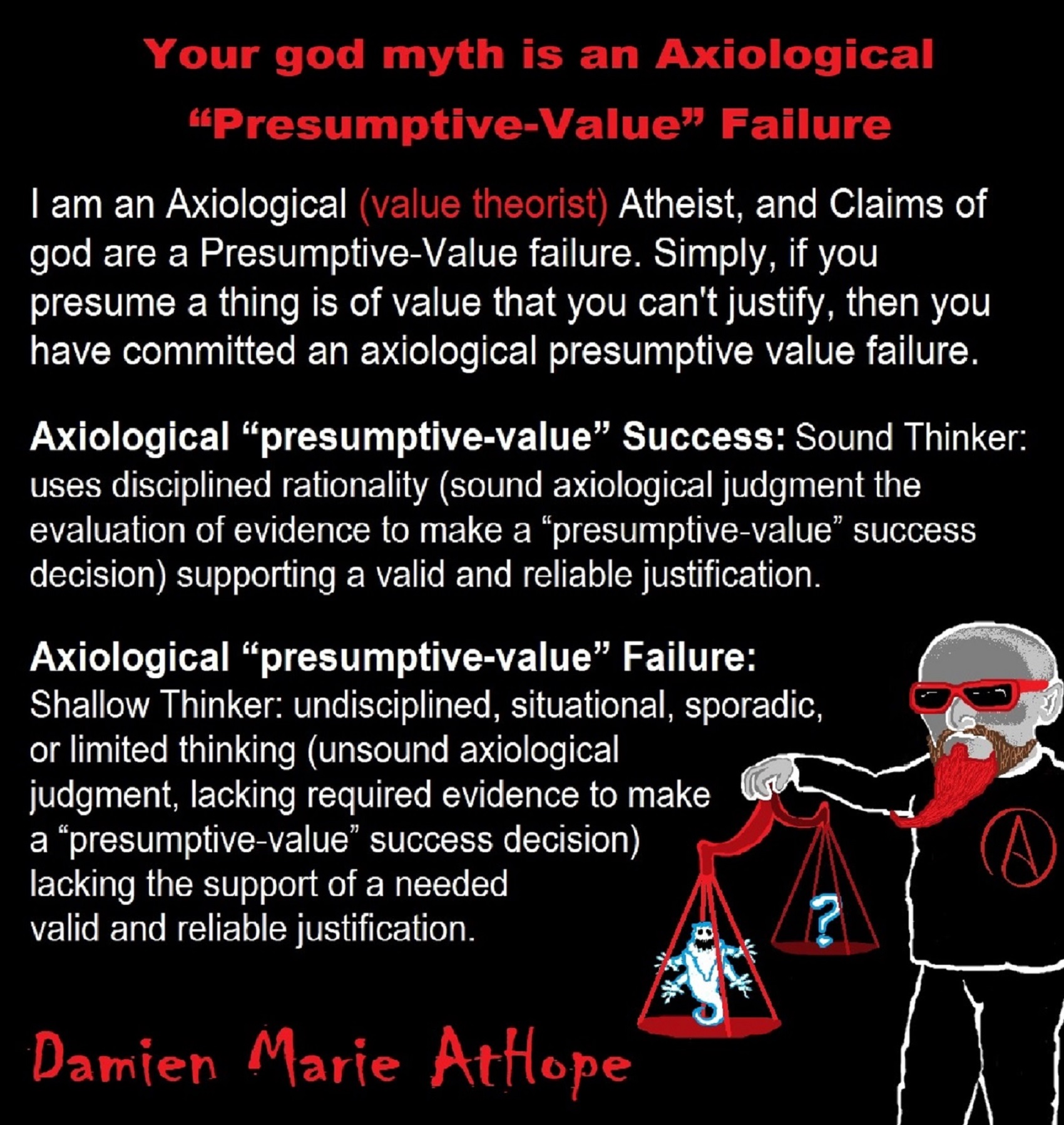
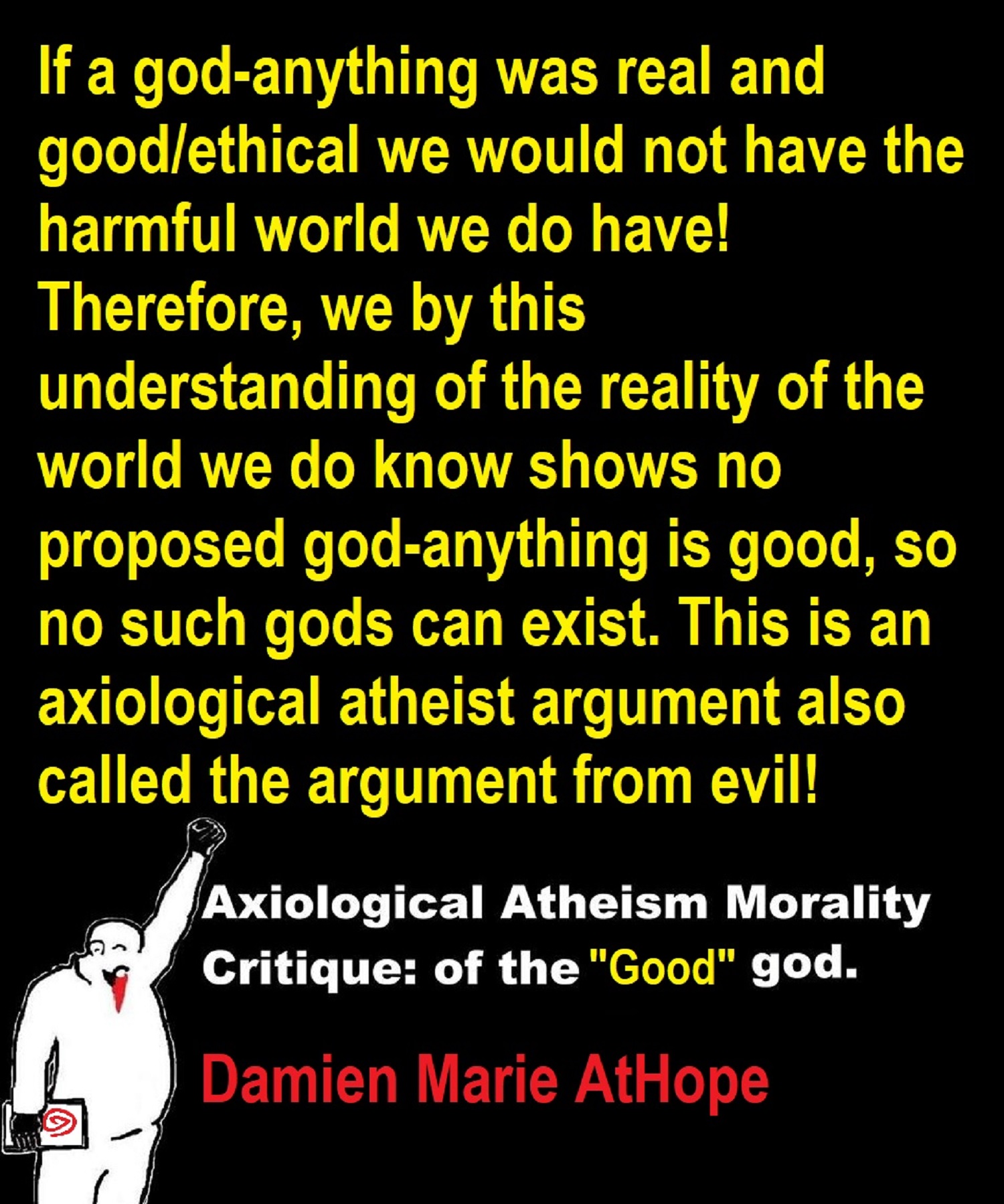
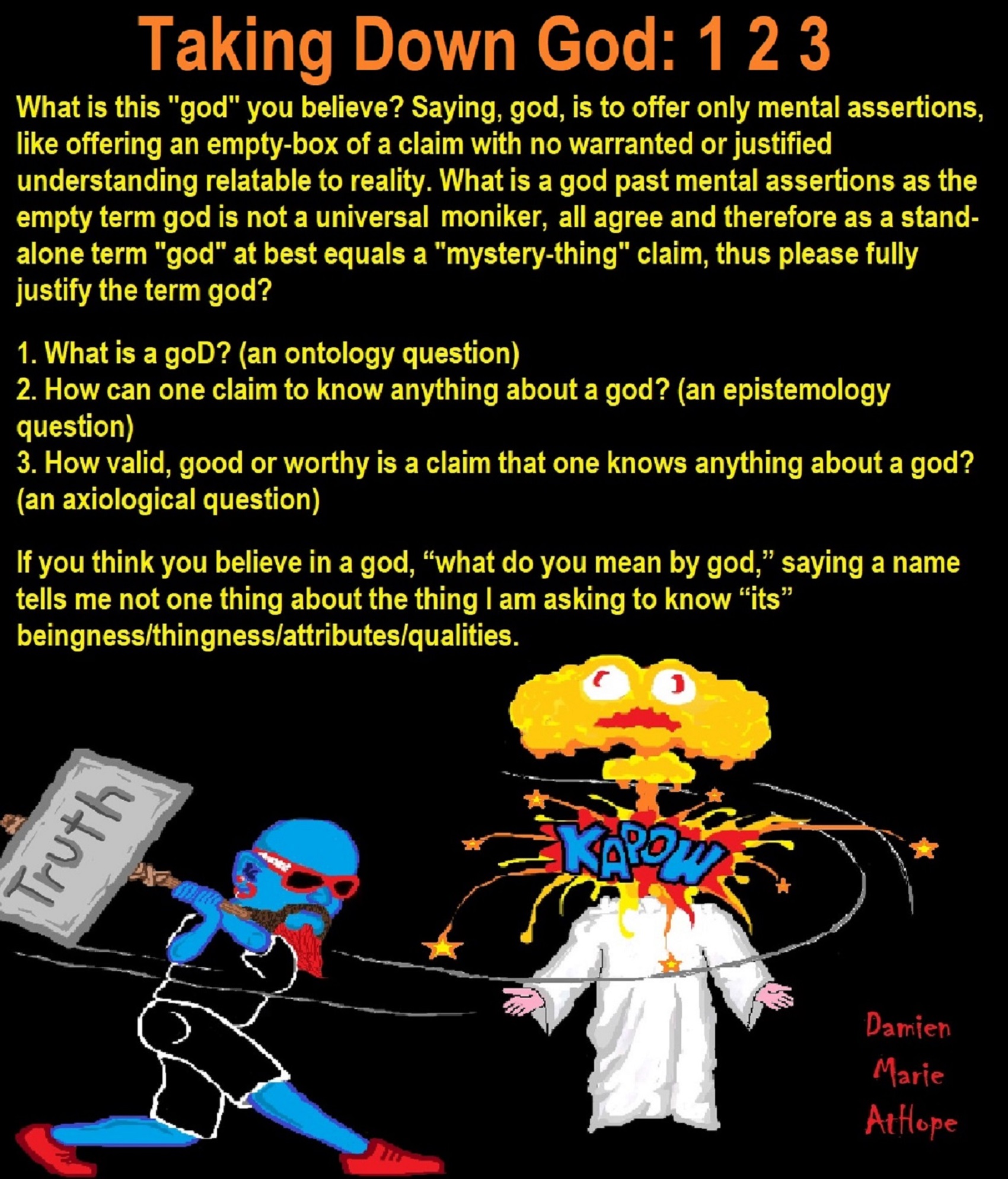
Interview of Formal Axiological Atheist Dr. William Kelleher
Axiological Atheism Morality Critique: of the bible god
Chastised in a Message on My Axiological Atheist Page & My Responses
Using Axiological Awareness to Assist in Argumentation.
Explaining Axiological theism, Axiological agnosticism, and Axiological atheism
Ontology, Epistemology, & Axiology argument/challenge protocol
On the Value of Being a Real Person
Axiology, Naturalism, Realism and Moral Theory Ideas
Philosophical Skepticism, Solipsism and the Denial of Reality or Certainty
Value-blindness Gives Rise to Sociopathic evil.
People Matter People Have Value
Reasons for or Types of Atheism
“In the end all we really have is each other and life is too damn short to not be kind.”
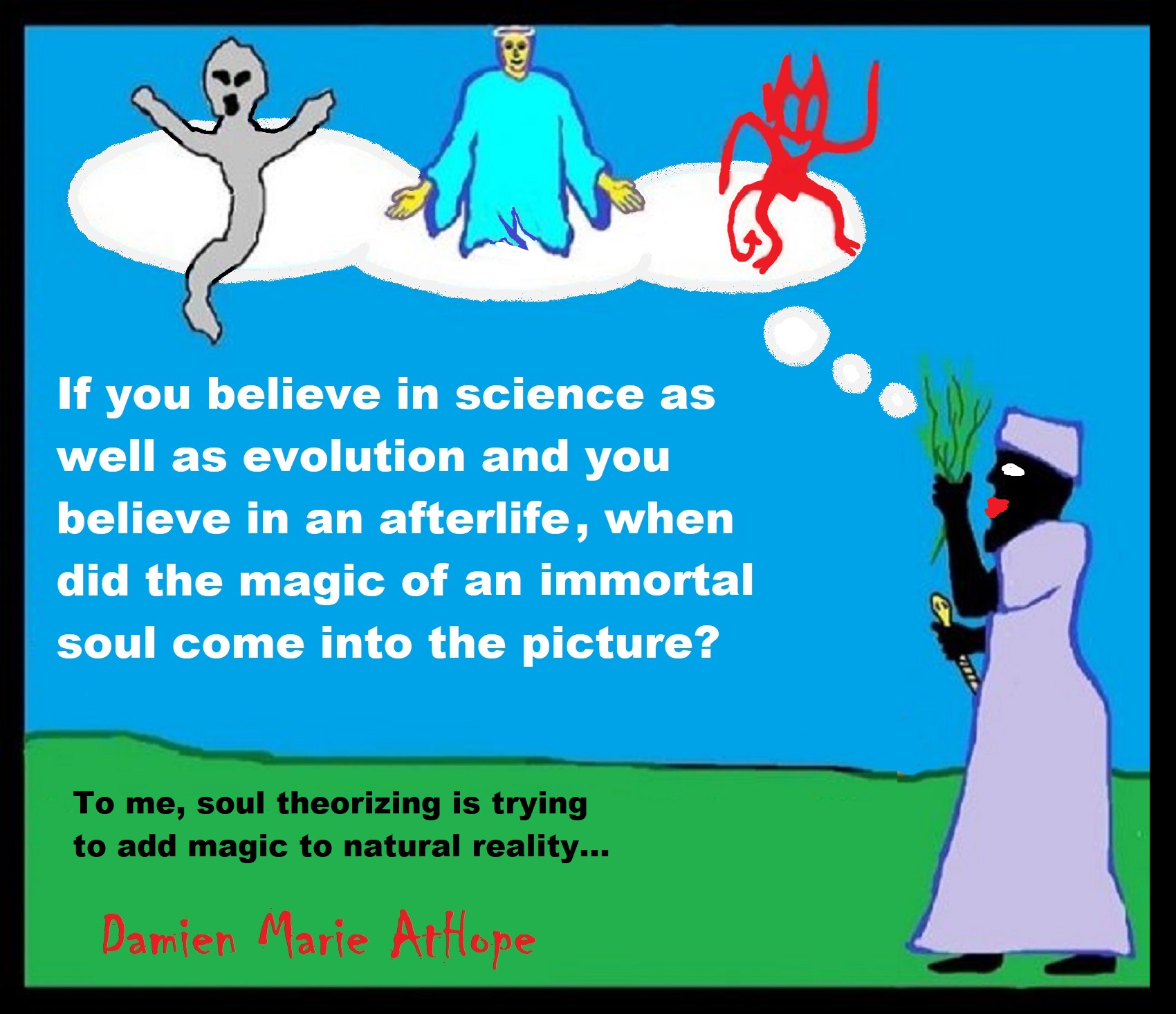
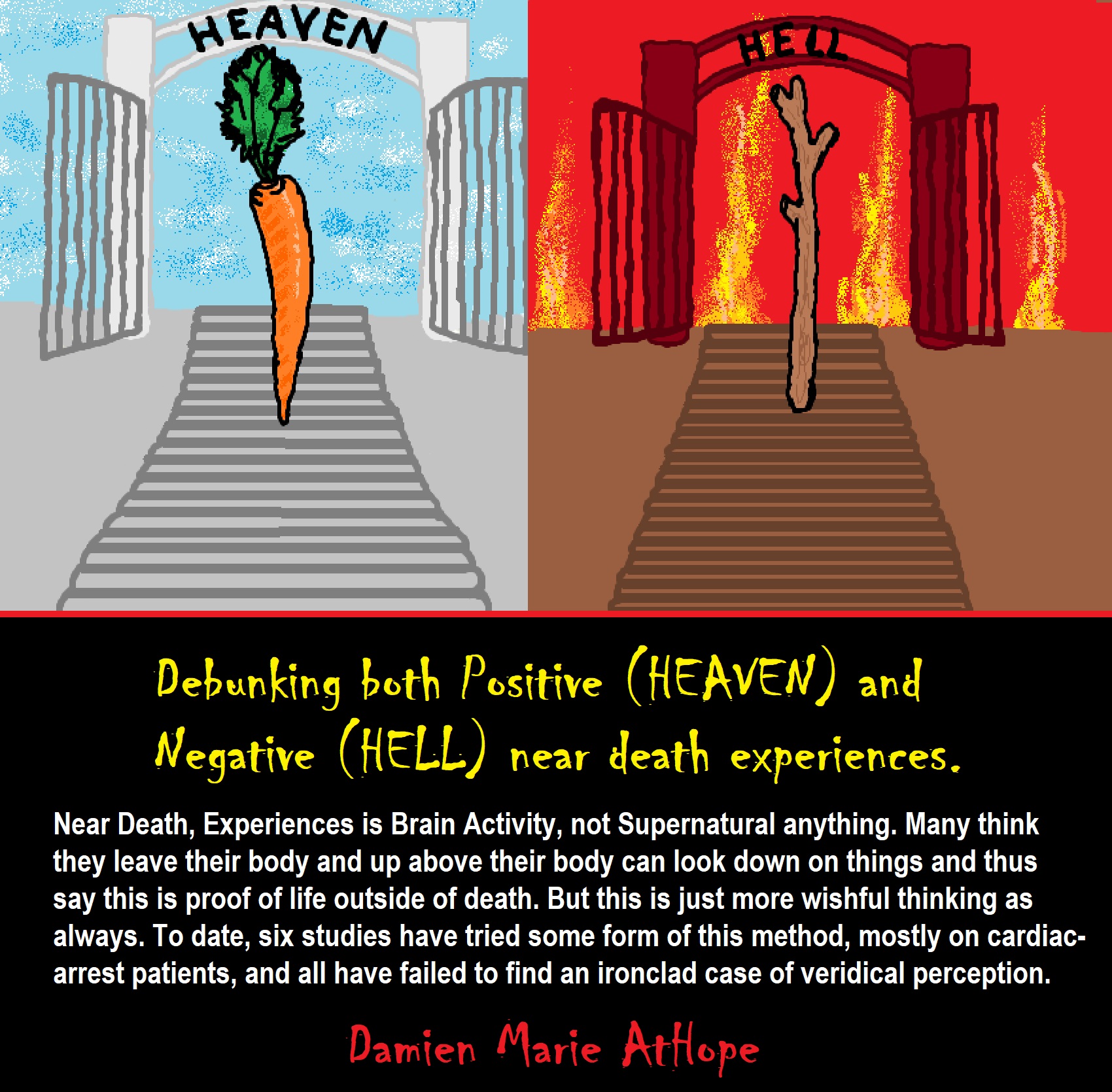



“Theists, there has to be a god, as something can not come from nothing.”
Well, thus something (unknown) happened and then there was something. This does not tell us what the something that may have been involved with something coming from nothing. A supposed first cause, thus something (unknown) happened and then there was something is not an open invitation to claim it as known, neither is it justified to call or label such an unknown as anything, especially an unsubstantiated magical thinking belief born of mythology and religious storytelling.

While hallucinogens are associated with shamanism, it is alcohol that is associated with paganism.
The Atheist-Humanist-Leftist Revolutionaries Shows in the prehistory series:
Show two: Pre-animism 300,000 years old and animism 100,000 years old: related to “Anarchism and Socialism”
Show tree: Totemism 50,000 years old: related to “Anarchism and Socialism”
Show four: Shamanism 30,000 years old: related to “Anarchism and Socialism”
Show five: Paganism 12,000 years old: related to “Anarchism and Socialism”
Show six: Emergence of hierarchy, sexism, slavery, and the new male god dominance: Paganism 7,000-5,000 years old: related to “Anarchism and Socialism” (Capitalism) (World War 0) Elite and their slaves!
Prehistory: related to “Anarchism and Socialism” the division of labor, power, rights, and recourses: VIDEO
Pre-animism 300,000 years old and animism 100,000 years old: related to “Anarchism and Socialism”: VIDEO
Totemism 50,000 years old: related to “Anarchism and Socialism”: VIDEO
Shamanism 30,000 years old: related to “Anarchism and Socialism”: VIDEO
Paganism 12,000 years old: related to “Anarchism and Socialism” (Pre-Capitalism): VIDEO
Paganism 7,000-5,000 years old: related to “Anarchism and Socialism” (Capitalism) (World War 0) Elite and their slaves: VIEDO
Paganism 5,000 years old: progressed organized religion and the state: related to “Anarchism and Socialism” (Kings and the Rise of the State): VIEDO
Paganism 4,000 years old: related to “Anarchism and Socialism” (First Moralistic gods, then the Origin time of Monotheism): VIEDO
I do not hate simply because I challenge and expose myths or lies any more than others being thought of as loving simply because of the protection and hiding from challenge their favored myths or lies.
The truth is best championed in the sunlight of challenge.
An archaeologist once said to me “Damien religion and culture are very different”
My response, So are you saying that was always that way, such as would you say Native Americans’ cultures are separate from their religions? And do you think it always was the way you believe?
I had said that religion was a cultural product. That is still how I see it and there are other archaeologists that think close to me as well. Gods too are the myths of cultures that did not understand science or the world around them, seeing magic/supernatural everywhere.
I personally think there is a goddess and not enough evidence to support a male god at Çatalhöyük but if there was both a male and female god and goddess then I know the kind of gods they were like Proto-Indo-European mythology.
This series idea was addressed in, Anarchist Teaching as Free Public Education or Free Education in the Public: VIDEO
Our 12 video series: Organized Oppression: Mesopotamian State Force and the Politics of power (9,000-4,000 years ago), is adapted from: The Complete and Concise History of the Sumerians and Early Bronze Age Mesopotamia (7000-2000 BC): https://www.youtube.com/watch?v=szFjxmY7jQA by “History with Cy“
Show #1: Mesopotamian State Force and the Politics of Power (Samarra, Halaf, Ubaid)
Show #2: Mesopotamian State Force and the Politics of Power
Show #3: Mesopotamian State Force and the Politics of Power (Uruk and the First Cities)
Show #4: Mesopotamian State Force and the Politics of Power (First Kings)
Show #5: Mesopotamian State Force and the Politics of Power (Early Dynastic Period)
Show #6: Mesopotamian State Force and the Politics of Power
Show #7: Mesopotamian State Force and the Politics of Power (Sargon and Akkadian Rule)
Show #9: Mesopotamian State Force and the Politics of Power (Gudea of Lagash and Utu-hegal)
Show #12: Mesopotamian State Force and the Politics of Power (Aftermath and Legacy of Sumer)

The “Atheist-Humanist-Leftist Revolutionaries”
Cory Johnston ☭ Ⓐ Atheist Leftist @Skepticallefty & I (Damien Marie AtHope) @AthopeMarie (my YouTube & related blog) are working jointly in atheist, antitheist, antireligionist, antifascist, anarchist, socialist, and humanist endeavors in our videos together, generally, every other Saturday.
Why Does Power Bring Responsibility?
Think, how often is it the powerless that start wars, oppress others, or commit genocide? So, I guess the question is to us all, to ask, how can power not carry responsibility in a humanity concept? I know I see the deep ethical responsibility that if there is power their must be a humanistic responsibility of ethical and empathic stewardship of that power. Will I be brave enough to be kind? Will I possess enough courage to be compassionate? Will my valor reach its height of empathy? I as everyone, earns our justified respect by our actions, that are good, ethical, just, protecting, and kind. Do I have enough self-respect to put my love for humanity’s flushing, over being brought down by some of its bad actors? May we all be the ones doing good actions in the world, to help human flourishing.
I create the world I want to live in, striving for flourishing. Which is not a place but a positive potential involvement and promotion; a life of humanist goal precision. To master oneself, also means mastering positive prosocial behaviors needed for human flourishing. I may have lost a god myth as an atheist, but I am happy to tell you, my friend, it is exactly because of that, leaving the mental terrorizer, god belief, that I truly regained my connected ethical as well as kind humanity.
Cory and I will talk about prehistory and theism, addressing the relevance to atheism, anarchism, and socialism.
At the same time as the rise of the male god, 7,000 years ago, there was also the very time there was the rise of violence, war, and clans to kingdoms, then empires, then states. It is all connected back to 7,000 years ago, and it moved across the world.
Cory Johnston: https://damienmarieathope.com/2021/04/cory-johnston-mind-of-a-skeptical-leftist/?v=32aec8db952d
The Mind of a Skeptical Leftist (YouTube)
Cory Johnston: Mind of a Skeptical Leftist @Skepticallefty
The Mind of a Skeptical Leftist By Cory Johnston: “Promoting critical thinking, social justice, and left-wing politics by covering current events and talking to a variety of people. Cory Johnston has been thoughtfully talking to people and attempting to promote critical thinking, social justice, and left-wing politics.” http://anchor.fm/skepticalleft
Cory needs our support. We rise by helping each other.
Cory Johnston ☭ Ⓐ @Skepticallefty Evidence-based atheist leftist (he/him) Producer, host, and co-host of 4 podcasts @skeptarchy @skpoliticspod and @AthopeMarie
Damien Marie AtHope (“At Hope”) Axiological Atheist, Anti-theist, Anti-religionist, Secular Humanist. Rationalist, Writer, Artist, Poet, Philosopher, Advocate, Activist, Psychology, and Armchair Archaeology/Anthropology/Historian.
Damien is interested in: Freedom, Liberty, Justice, Equality, Ethics, Humanism, Science, Atheism, Antiteism, Antireligionism, Ignosticism, Left-Libertarianism, Anarchism, Socialism, Mutualism, Axiology, Metaphysics, LGBTQI, Philosophy, Advocacy, Activism, Mental Health, Psychology, Archaeology, Social Work, Sexual Rights, Marriage Rights, Woman’s Rights, Gender Rights, Child Rights, Secular Rights, Race Equality, Ageism/Disability Equality, Etc. And a far-leftist, “Anarcho-Humanist.”
I am not a good fit in the atheist movement that is mostly pro-capitalist, I am anti-capitalist. Mostly pro-skeptic, I am a rationalist not valuing skepticism. Mostly pro-agnostic, I am anti-agnostic. Mostly limited to anti-Abrahamic religions, I am an anti-religionist.
To me, the “male god” seems to have either emerged or become prominent around 7,000 years ago, whereas the now favored monotheism “male god” is more like 4,000 years ago or so. To me, the “female goddess” seems to have either emerged or become prominent around 11,000-10,000 years ago or so, losing the majority of its once prominence around 2,000 years ago due largely to the now favored monotheism “male god” that grow in prominence after 4,000 years ago or so.
My Thought on the Evolution of Gods?
Animal protector deities from old totems/spirit animal beliefs come first to me, 13,000/12,000 years ago, then women as deities 11,000/10,000 years ago, then male gods around 7,000/8,000 years ago. Moralistic gods around 5,000/4,000 years ago, and monotheistic gods around 4,000/3,000 years ago.
To me, animal gods were likely first related to totemism animals around 13,000 to 12,000 years ago or older. Female as goddesses was next to me, 11,000 to 10,000 years ago or so with the emergence of agriculture. Then male gods come about 8,000 to 7,000 years ago with clan wars. Many monotheism-themed religions started in henotheism, emerging out of polytheism/paganism.

Damien Marie AtHope (Said as “At” “Hope”)/(Autodidact Polymath but not good at math):
Axiological Atheist, Anti-theist, Anti-religionist, Secular Humanist, Rationalist, Writer, Artist, Jeweler, Poet, “autodidact” Philosopher, schooled in Psychology, and “autodidact” Armchair Archaeology/Anthropology/Pre-Historian (Knowledgeable in the range of: 1 million to 5,000/4,000 years ago). I am an anarchist socialist politically. Reasons for or Types of Atheism
My Website, My Blog, & Short-writing or Quotes, My YouTube, Twitter: @AthopeMarie, and My Email: damien.marie.athope@gmail.com

